
THE BULLETIN BOARD
POSTING MATTERS OF PARTICULAR INTEREST AND IMPORTANCE TO ALL HANDS
Navy Considering 'Service Age' Plan As Basis for Releasing Older Men
The Navy is considering a computed service age formula for use in determining the eligibility for release to inactive duty or separation from
the Navy of older personnel whose services are no longer required.
The formula would be in no way a demobilization measure, since the personnel strength of the Navy will not be reduced below the authorized maximum
of 3,389,000, which was reached on 30 June 1945. Because it is not a demobilization measure it gives no weight to certain factors, such as dependency
and combat service, which might be a part of a demobilization formula.
The purpose of the new release policy would be to increase the over-all efficiency of the fighting forces by releasing older men and men not fully
qualified for general duty, thereby permitting the Navy, through Selective Service and voluntary enlistments, to increase the number of younger men
who will be trained and fully qualified to meet the future needs of the fleet.
The following is a description of details of the release formula now under consideration.
Under the provisions of the formula, the Navy will, upon individual application, release to inactive duty or accept the resignation of certain
Reserve officers and will release certain enlisted personnel who are of requisite computed service age.
Service-Age Formula
The service age of officers and enlisted personnel will be computed by allowing one year for each year of age figured to the nearest birthday
and one year for each four months of active duty in the Navy since 1 Sept. 1939.
The minimum computed service age required for release, resignation or discharge varies for different categories of the service as follows:
| |
Minimum
computed
Service Age |
| Reserve line officers |
53 |
| Enlisted reservists |
53 |
| U. S. Navy inductees |
53 |
| Enlisted Regulars serving during the war under expired enlistments |
53 |
| Reserve officers of the Supply Corps |
55 |
| Reserve officers of the Civil Engineers Corps |
57 |
Higher minimum computed service age requirements are established for officers of the Supply Corps and the Civil Engineers Corps since there
are fewer officers of these corps than of the Line whose services can be spared.
The minimum computed ages are subject to future change in the light of experience.
Reserve officers of the Medical Corps, Dental and Chaplain Corps are not eligible for inclusion under the terms of the formula because of existing
personnel shortages in these corps. Should personnel shortages be overcome, the formula will be applicable to them.
The formula will not apply to officers of the Regular Navy (except temporary officers whose permanent status is that of enlisted men and who are
serving under expired enlistments), to enlisted personnel of the Regular Navy (except those serving under expired enlistments), to retired enlisted
personnel on active duty, or to fleet reservists other than those assigned to Class F-2, USNR, upon termination of their enlistment in the Regular Navy.
30,600 Eligible
It is estimated that by December 1945, approximately 10,000 commissioned and warrant officers of the Line, 600 commissioned and warrant officers
of the Supply Corps, and 1,000 commissioned and warrant officers of the Civil Engineer Corps, would be eligible under the formula to apply for release
or to resign.
Estimated enlisted personnel eligible under the formula to apply for discharge by December 1945 would total approximately 19,000.
Requirements of the formula have been designed to permit the return to civil life of officers and enlisted personnel whose services can best be
dispensed with. The formula takes into consideration only the two basic elements, age and length of service, because additional considerations such
as length of service outside the country or in combat areas cannot be applied without making eligible for release personnel whom the Navy cannot
afford to lose at the present time, without diminishing operational efficiency. While fairness to the individual was considered a basic requirement
to be met insofar as possible in drawing up the formula, the needs of the naval service were and will remain the prime consideration.
Exceptions to Formula
While the formula would establish the basic conditions which naval personnel must meet in order to be eligible for return to civil life, certain
exceptions to the application of the formula are provided for as follows:
Where it is impossible to furnish a fully trained relief for an officer who applies for release or submits his resignation under the terms of the
formula, a period not to exceed 90 days will be allowed for in-service training of his relief following reporting for duty.
Where an officer applying for release or submitting his resignation under the terms of the formula has such unique qualifications that it does not
appear possible to furnish a reasonable suitable relief, and where his commanding officer can establish a condition of military necessity as distinguished
from convenience, his case will be reviewed and finally decided by the Navy Department.
Enlisted personnel 42 years of age or older will continue to be eligible for discharge under conditions heretofore in effect.
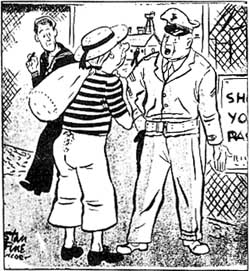 |
| Wheel Watch (NAS, Cape May, N. J.) |
| "This is Cape May all right, but there's no man o' war by that name tied up here." |
Enlisted Men's Allowance For Clothing Is Raised
A $3 increase in the quarterly clothing allowance became effective 1 July for all enlisted men except CPOs, cooks, stewards, and band members,
who receive a $1.25 increase (Alnav 155-45; NDB, 15 July, 45-786).
Under Executive Order 9583, enlisted men who formerly received $9 each quarter will get $12 and those who received $18.75 (CPOs, cooks, stewards
and band members) will get $20.00.
The order, which modified Executive Order 9356 ( Appendix A, BuSandA Manual), also provides a decrease crease of $2.20 in the initial clothing
allowance paid enlisted men and an increase of $2.20 in the clothing allowance paid men advanced to CPO, cook and steward and men (except CPOs) upon
first assignment to duty as band members.
-- 65 --
Navy to Pay Travel Expense For Enlisted Rehabilitation Leave
Enlisted personnel returning from overseas for rehabilitation leave prior to reassignment by ComWesSeaFron or SuborComSerLant will travel at
Government expense under new regulations announced last month by BuPers (Pers-6303-nu-9, 2 July 1945).
Pending further assignment, such personnel will be ordered to temporary duty at a number of designated recruiting and receiving activities nearest
their place of leave at Government expense with the privilege of delaying en route for all leave, plus travel time, to which they are entitled under
current directives. During that period they will draw full pay and rations.
Prior to the issuance of the new regulations, personnel returning from overseas for reassignment were granted rehabilitation leave with authority
to report at their own expense, not subject to reimbursement, at various locations throughout the country for further assignment.
The new provisions will benefit approximately 25,000 men per month. The provisions of the directive are not retroactive nor will they apply to men
going on leave from ships entering coast ports who remain assigned to those ships for duty.
The following is the list of naval activities to which a man may report upon completion of leave:
Receiving Stations: Boston, Mass.; New York, N. Y.; Philadelphia, Pa.; Washington, D. C.; Norfolk, Va.; Charleston,
S. C.; Galveston, Tex.; Camp Elliott, San Diego, Calif.; San Pedro, Calif.; Seattle, Wash.; Naval Reserve Armory, Chicago, Ill.
Navy Recruiting Stations: Buffalo, N. Y.; Detroit, Mich.; Columbus, Ohio; Raleigh, N. C.; Birmingham, Ala.; Nashville,
Tenn.; Minneapolis, Minn.; Des Moines, Iowa; St. Louis, Mo.; Omaha, Neb.; Kansas City, Mo.; Little Rock, Ark.; Oklahoma City, Okla.; Dallas, Tex.; Denver,
Colo.; Santa Fe, N. M.; Helena, Mont.; Salt Lake City, Utah; Phoenix, Ariz.; Boise, Idaho; El Paso, Tex.; Atlanta, Ga.; Cleveland, Ohio; Cincinnati, Ohio;
Indianapolis, Ind.; Pittsburgh, Pa.; Macon, Ga.; Jackson, Miss.; Columbia, S. C.; Huntington, Va.; Louisville, Ky.
Personnel may also report to: Personnel and Training Command, Naval Repair Base, New Orleans, La. and the Training and
Distribution Center, Shoemaker, Calif.
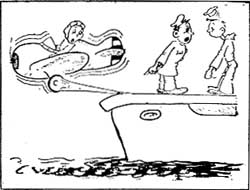 |
| Bluejacket (NATTC, Memphis) |
| "All right, who's the wise guy who left his gum on the deck?" |
Specialist Rates To Be Curtailed
A curtailment of specialist ratings is indicated by BuPers Circ. Ltr. 21445 (NDB, 31 July, 1945) which states that as a general policy BuPers will
look with disfavor upon requests for increase in allowance of specialist billets and upon requests for changes from general service ratings to specialist
ratings.
Specialist ratings were established to facilitate the rapid expansion of the Navy at the beginning of the war and to enable the Navy to earmark
civilian trained specialists for their specialty while serving in the Navy. As the need for specialists is no longer critical and as no provision
is being made for them in the postwar Navy, their numerical increase will be restricted.
In order that the specialist (E) rating may initially be implemented, temporary exception is being made in this case by BuPers. (For details on
Sp(E) see page 79.)
Advancement to PO3c Now Takes 7 Months' Combined Service as S1c and S2c
A further tightening of rules for advancement of enlisted personnel to pay grade 4(P03c) has been put into effect by Alnav 163-45 (NDB, 31 July)
which was issued on 17 July, effective upon receipt.
Under this revision of the basic promotional directive (BuPers Circ. Ltr. 297-44: NDB, July-Dec. 44-1145), personnel are now required to spend seven
months in pay grades 5 and 6 combined (S1c and S2c) before being eligible for advancement to P03c.
Eyeglasses Now Obtainable At Six Additional Places
Six new dispensing points for free optical service for Navy, Marine Corps and Coast Guard personnel (see ALL HANDS, March 1945, p. 75) have been
announced by the Navy (NDB, 15 July, 45-803).
The additional places at which personnel on active duty can obtain, entirely at Government expense, new spectacles or lenses or frames as replacements
for damage or loss in performance of duty, are:
NT&DC, Camp Peary, Williamsburg, Va.
Naval Hospital, NOB, Norfolk, Va.
NT&DC, Camp Elliott, San Diego, Calif.
Naval Hospital, Corona, Calif.
RecSta, NOB, Terminal Island, (San Pedro), Calif.
Naval Hospital, Corvallis, Ore.
Men Outside U. S. for 24 Months Are Eligible for 30 Days Leave in States
Between 8,000 and 12,000 officers and enlisted men per month who have had long tours of duty overseas or afloat are made eligible for Stateside leave
under provisions of Alnav 160-45 (NDB, 31 July) announced by SecNav on 16 July 1945 to all ships and stations.
Under provisions of the directive officers and men who have not been in the United States for 24 months may be granted leave of 30 days in the States,
provided the total absent from the ship or station at any one time on account of furlough does not exceed 5% of the personnel on board.
Discretion to grant the leave, plus travel time, is left to the CO. Reliefs or replacements will not be furnished. Ships or stations will be required
to operate with up to 5% reduction.
|
CBs to Get Equal Chance For Shore Duty in U. S.
CB enlisted personnel returning from overseas for reassignment will be considered for shore duty in the U. S. under the same conditions as other
enlisted men, under BuPers letter of 4 July 1945 (Pers-6-ES-4).
When CB personnel report to NCTC, Camp Endicott, Davisville, R. I., the NCBRD, Camp Parks, Shoemaker, Calif., and the ABRB, Port Hueneme, Calif., from
rehabilitation leave for reassignment, those activities will nominate those meeting the shore-duty requirements which are prescribed. Requirements for
nomination, prescribed by ComWesSeaFron and SuborComServLant, will conform with shore-duty requirements for general service ratings.
When shore billets are not available to cover all men so nominated, they will be reassigned to construction battalions being formed at the command
from which they were nominated.
CB personnel transferred to shore duty under the directive will retain their CB designator if they hold a CB rating and are not a general-service
rating assigned to construction battalions.
Shore Duty Ratio Set At 90% from Pacific And 10% from Atlantic
Ninety percent of the enlisted personnel to be assigned shore duty in the States after service afloat or overseas are to come from the Pacific area
and 10% from the Atlantic area, under provisions contained in a letter dated 4 June 1945 from the Chief of Naval Personnel to continental commands
(Pers-6 NCD-1 P16-3/MM). Personnel returning from the Pacific will be assigned shore duty by Com WesSeaFron and ComFair, West Coast, and those from
the Atlantic by SuborComServLant and ComAirLant.
-- 66 --
Navy Relief Society Lent Over 4 Million in 1944; Typical Cases Listed
Loans totaling $4,309,437 and gratuities totaling $881,511 were distributed by the Navy Relief Society in 1944, according to a recent report by
the executive vice president, Vice Admiral R. M. Brainard, USN (Ret).
The society, now in its 42d year, gives assistance in a multitude of situations to officer and enlisted personnel of the naval service, and their
dependents and to dependent widows, minor orphan children and dependent mothers of deceased personnel.
Typical situations in which aid may be given:
- Where a man has lost his life and the widow, minor children or truly dependent parent needs assistance pending the receipt of government
benefits; or to provide a widow with transportation to her family, or to complete a course of vocational training, if she would otherwise have
insufficient funds for basic needs.
- In the case of a wife of a man reported missing with no family allowance or allotment being paid, pending the receipt of such payments.
- When hospitalization is required for acute illnesses by dependents in areas where naval facilities for such care are not available,
assistance may be given by helping the serviceman or his dependents to pay for such service at ward or minimum rates. The society is
unable to finance cases involving chronic illness or situations which would involve long term commitments. When hospital ward accommodations
which include the services of a hospital doctor are not available, and when services of Navy medical officers are not available, the society
may assist in paying part or all of a private doctor's fee.
- Funeral expenses for dependents.
- Catastrophes involving distress of dependents for basic living essentials.
- Travel in special cases (critical illness, death of wife or child, etc.).
- Travel and subsistence to finance leave of a man returned from overseas, upon recommendation of the man's CO stating that the man's
funds are inadequate due to valid causes beyond the man's control.
The more common types of requests for assistance for which the funds of the Society are NOT available are:
- To assist in maintaining a standard of living incommensurate with the pay and allowance of the man.
- To pay emergency expenses which the family is able to meet itself.
- To provide emergency maternity and infant care in cases where such services are available under the program of the Children's Bureau of the
Department of Labor.
- To finance business ventures or to purchase non-essentials.
- To finance leave or liberty (except under unusual circumstances).
- To pay taxes or interest.
- To pay debts created for nonessentials, or debts contracted prior to the man's entry into the service.
- To dependents of men convicted of serious military offenses.
Financial assistance may be in the form of a loan, without interest; an outright gift, or a combination of the two, depending upon a consideration
of all the pertinent facts and circumstances in a given case.
The society's work is carried on by headquarters, 2118 Massachusetts Ave., N. W., Washington 25, D. C., and by auxiliaries at the principal naval
stations in the naval districts. Requests for assistance, except those from Coast Guard personnel and their dependents, should be directed to
headquarters if there is no auxiliary or branch in the immediate vicinity of the applicant. Only exceptions are applicants in the 9th Naval District
who should address their requests to the Great Lakes Auxiliary, Navy Relief Society, U. S. Naval Training Center, Great Lakes, Ill.
Requests by Coast Guard personnel or their dependents for assistance should be directed to Coast Guard Welfare, Coast Guard Headquarters, Washington
25, D. C., if there is no representative of Coast Guard Welfare in the immediate vicinity of the applicant. Coast Guard personnel or their dependents
who apply to an auxiliary will be assisted provided there is no Coast Guard representative in their vicinity.
Applications to Headquarters, Navy Relief Society; to Coast Guard Welfare or to the Great Lakes Auxiliary, should be forwarded through the American
Red Cross if the need is immediate and urgent. Applications for assistance should include the full name, rate and service number of the serviceman as
well as the name of the station to which he is attached.
Navy Relief Society is not a government agency and is supported entirely by voluntary contributions.
AN OPEN LETTER TO RESERVE OFFICERS
To NAVAL RESERVE OFFICERS:
This letter is about your opportunity to transfer to the Regular Navy.
I should like to explain here the full details of how a USNR officer could become a USN and what kind of career he would have before him. The
details, however, depend upon future legislation. Congress has recessed until autumn, making enactment of the necessary new laws before that time
impossible.
Meanwhile, I want Reserve officers to know as much about our plans as we can state with assurance. Here are three fundamentals:
- The Navy's need for officers after the war is governed by the size of the Fleet which we must keep to defend the United States and to discharge
our international agreements.
- We know now that the Navy will need after the war more USN officers than it has - perhaps 30,000 more.
- The best source of more officers is the Navy itself, particularly Reserve and temporary officers now on duty.
|
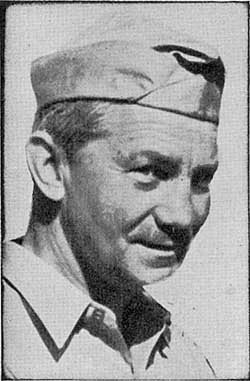 |
| Secretary Forrestal |
|
What will the Navy offer these officers who transfer to the Regular service? We expect to offer you:
- Transfer to the Regular Navy in a manner which will place you on an equal footing with USN officers of about the same age and of the same length
of service in rank.
- A professional naval education which will be the best in the world.
- An equal opportunity in promotions and assignments.
These are the objectives which we have set ourselves and I for one am determined that the detailed plan, when it is completed, shall embody them.
The Navy wants young officers, particularly young line officers with experience at sea. Fortunately, the younger an officer is, the more the Navy
has to offer him in terms of comparable pay, promotion and, eventually, retirement benefits.
Transfers will be subject to standards of age, past performance, physical fitness, rank, etc. These standards will be announced in ALL HANDS as
they become definite.
But the most important qualification of all is the will to serve. Peace without power is an empty dream. The United States Navy will be one of
the great elements of the power which insures the peace of the world-and the freedom of our own nation. The officers and men who volunteer to serve
in the Navy after the war, therefore, have a high mission to which any American can dedicate his life with honor and satisfaction.
Sincerely,
- JAMES FORRESTAL
|
-- 67 --
Censorship of Private Communications Being Relaxed Somewhat, Navy Announces
Now it can be told. That is . . . . up to a certain point.
Navy censorship of private communications, designed to protect the lives of personnel and to suppress at the source information which may be of
value to the enemy, has now been relaxed somewhat. Under certain conditions, personnel may write home and tell something about the actions they have
been in and, in some cases, where they are stationed.
Men assigned to surface craft which have taken part in sea battles may relate their personal experiences in the engagements once their CO gives
them permission. COs must wait a minimum of 30 days following announcement of the engagement to press and public before granting this permission
unless the vessel has been identified by name as having taken part in the engagement in which case the unexpired portion of such time may be waived.
Once the CO has given you the "go ahead" signal you can tell the folks, for instance, how you manned an antiaircraft gun which stopped two Jap
Kamikaze attacks or other details of your personal experiences in that battle.
In the case of surface craft leaving port, COs may set a minimum of 30 days, after which personnel under their command may write home to say they
visited that port.
Personnel attached to mobile assault units may relate their personal experiences during the assault phase of an operation once the identity and
location of the unit are officially announced. However, disclosure of the location of personnel upon completion of the assault phase is prohibited.
Strictly "hush, hush" is any reference in letters home to the strength and tactical disposition of fleet units, such as mention by name of any
other units; discussion or reference to battle damage; information derived from intelligence sources, and narrative descriptions not within the
writer's personal experiences.
 |
| Saipan Beacon (Island Command, Saipan) |
| "I don't care how you did it on Saipan, get in the tub!" |
None of the modifications of the censorship regulations apply to personnel in the submarine service. For their own security, censorship of their mail
must be as strict as in the past. Shore-based personnel assigned to most Navy-number addresses in the Pacific are permitted to say, in a general way,
where they are, but they cannot include military information concerning the exact location or size, activities or employment of the units concerned.
They may refer to action on the islands in general terms, mentioning Jap air raids or strafing when such attacks take place, but they may not reveal
the number of enemy planes taking part or the number of bombs dropped.
Men on permanent duty on many Pacific islands are permitted to name their location as "somewhere" on these islands even though they do not have a
Navy-number address. They may talk about enemy action but they can't be specific as to date, damage, casualties, etc. This regulation effects personnel
in the following islands and atolls: Angaur, Abemama, Baker, Canton, Christmas, Eniwetok, Fanning, French Frigate Shoal, Guam, Johnston, Kawjalein,
Makin, Majuro, Midway, Palmyra, Peleliu, Saipan, Tarawa, Tinian and Ulithi.
Additionally, CincPoa has authorized the Commander, South Pacific Force, the Commander Forward Area, Central Pacific, and the Commander, North Pacific
Force, to authorize certain units under their command, not having a Navy number address, to reveal general location in personal correspondence provided
they are of the opinion that such revelation does not constitute a breach of military security.
Foreign-language letters from the Pacific which cannot be translated locally are forwarded for censorship and release to the District Intelligence
Officer, (Chief Censor), Navy No. 59, FPO San Francisco.
The forces afloat and Fleet Air Units in the Atlantic areas are still subject to full censorship because their movements are still secret. However, the
Commander of the Naval Forces in Europe has done away with the unit censorship of personal mail of shore-based personnel. And at shore bases under the
Commander-in-Chief of the Atlantic Fleet, censorship has been reduced to spot-checking of the mail.
Additional modifications of censorship regulations now permit transmittal of personal recordings from or to naval personnel overseas. Recordings from
personnel overseas must be censored at the source.
Fleet personnel also may receive personal wire dispatches concerning death, serious illness or accidents, birth notices and other matters of great
personal importance. Messages of this type should be addressed to the man's ship, squadron, or unit, and sent in care of the Naval District Commandant
nearest the sender or to BuPers, Navy Department, Washington 25, D. C., for forwarding via Navy communication facilities.
Shore-based personnel abroad may receive personal dispatches via Navy communications when no commercial facilities are available at their bases.
Procedure for sending is same as above.
Fleet and overseas shore-based personnel may reply to personal dispatches via Navy communications at the discretion of the CO and when security
conditions permit. These messages will be in Class "A" form with the ultimate addressee and the name and rank of the sender in text. Security permitting,
they will be in cleat, otherwise encrypted. Such messages will be addressed to the Naval District Commandant nearest the addressee. The latter will make
final delivery by filing the dispatch with Western Union as a collect message, or by telephone, hand, or mail, if these means are more practicable.
Modifications of censorship regulations mentioned in this article are contained in OpNav Letters: Op-16-B-2, A7-2/QN, Ser. 31316 (NDB, 15 Feb., 45-136);
Op-16-B-2, A7-2/QN, Ser. 557716 (NDB, 30 April, 45-422); Op-16-B-2, A7-2/QN, Ser. 1817716 (NDB, 15 July, 45-793); Op-16-B-2, A7-2/QN, Ser. 34116 (NDB, 15 May,
45-486); and Pacific Fleet letters, 9L-45, dated 18 Jan. 1945, and 55L-44, dated 26 Oct. 1944.
Mailing Schedule Changed For All Allotment Checks
A new schedule for mailing all Navy allotment checks was announced last month. The check for July will be mailed on 2 August, the check for August on
3 September and the September check on 4 October. Thereafter checks will be mailed on the fifth of each month. June allotment checks were mailed on 2 July.
The new schedule was established because of the tremendous volume of monthly payments and to insure continuity of proper payments now and throughout
the period following victory over Japan.
Officers Given Chance to Express Duty Preference Upon Arrival in States
Officers reporting to the States after duty overseas or afloat are now interviewed by classification officers with an eye toward reassigning them to
available billets which make the best possible use of their experience. The interview is held as soon as they arrive in the States so that they will not
be delayed in starting on their leave.
The officers are given an opportunity to express their preference for next duty assignment, and if billets are available they are assigned to the duty
of their choice following completion of leave.
The plan is now in effect in the 1st, 3d, 4th, 5th, 7th, 11th, 12th and 13th naval districts. Details were announced in the July 1945 Journal of
Officer Classification and Selection.
-- 68 --
Plan Postwar Resumption Of Rhodes Scholarships With Grants Open to Vets
Plans are now being considered for resumption of competition for Rhodes scholarships after the war under revised rules to give men now in military
service an opportunity to qualify, according to a letter received by the Navy Department from Dr. Frank Aydelotte, American Secretary to the Rhodes
Trustees.
The scholarships, for study at the University of Oxford in England, are made for two years, and may be extended for a third year for candidates whose
records and plans for study justify this extension. The stipend is 400 British pounds a year, about $1,600.
In normal times Rhodes Scholarships are open only to male citizens of the U.S. between the ages of 19 and 25 who are unmarried and have completed
at least two years of college work before applying. In order that men who would have been eligible since 1939-when election of Rhodes scholars was
suspended for the duration of the war-may have a chance to compete after the war, relaxation of the rules on age and marriage is now under discussion.
In addition, the Rhodes Trustees are considering the question of providing a number of extra scholarships for men who would have been eligible
between 1939 and the end of the war against Japan.
The proposed relaxation of rules on age and marriage would also apply to men whose scholarships were interrupted by the war or not yet begun. They
will be allowed to resume their scholarships whenever they are free to do so. It is necessary only that these men communicate with the Warden of Rhodes
House and make sure that their colleges are ready to receive them.
While postwar rules for Rhodes Scholarship competition have not been finally determined, the selection machinery in the U. S. is being rapidly
reorganized. For information, when available, intending candidates may write to their own colleges or universities, or directly to Dr. Aydelotte at
the Institute for Advanced Study, Princeton, N. J.
$1,800 Scholarship Offered By Rensselaer Polytechnic
A four-year tuition scholarship, amounting to $1,800, is being offered by Rensselaer Polytechnic Institute at Troy, N. Y., to the son of an officer,
petty officer or non-commissioned officer on the active or retired list of the Navy or Marine Corps, of deceased personnel in those categories, or of a
naval reserve officer on active duty.
For thee first time since the war began, it will be possible for a man on active duty in the Navy or Marine Corps to accept the scholarship. If he
meets the requirements and is selected, the Navy has announced that he will be placed on inactive duty for the period of the scholarship.
Applications must be received in BuPers on or before 1 Oct. 1945 on a form similar to that shown in BuPers Circ. Ltr. 212-45 (NDB, 31 July, 1945).
The successful applicant will enter the Institute in November 1945.
Non-Rated Torpedomen Get Chance to Qualify For Other Navy Rates
Because of an excess of rated torpedomen, COs have been authorized to remove the (TM) designator from the rating of non-rated men who graduated from
Class "A" Torpedomen Schools. This will make it possible for these men, who are not needed as torpedomen, to strike for other ratings.
Not counting non-rated men who have had this training, BuPers Circ. Ltr. 210-45 (NDB, 31 July) estimates that the Navy at the present time has an
excess of 20% of rated torpedomen, due to reduced requirements for torpedomen.
Inflatable Preservers Need Frequent Testing
Because of deterioration in storage, some belt-type life preservers which are inflated by mouth have developed leaks. To insure that serviceable life
preservers are furnished personnel, a directive recently issued by BuShips (NDB, 30 June, 45-743) recommends that all such preservers be tested as soon
as they are received on board by inflating them by mouth and submerging them in water to detect any leaks. It is also recommended that individuals inflate
their preservers at least once a week to make certain that no leaks have developed due to wear. It is not, however, necessary that they may be submerged
in water each time.
'All Hands' To Run Navy's "Picture of the Month"
A new feature, the Navy's "Picture of the Month," will appear regularly in ALL HANDS beginning with this issue (see back inside cover). The pictures will be chosen by Capt. Edward J. Steichen, USNR, world-famed photographer and Director of
the Navy Photographic Institute.
Besides appearing as ALL HANDS "Picture of the Month," the winning photographs will be considered for the Navy Photographic Institute awards. These
awards will be made annually on Navy Day by the Secretary of the Navy, and the selected photographs will be the basis of Navy exhibitions throughout the
world.
First "Picture of the Month," in this issue, was taken on 1 July 1945 by Chief Photographer's Mate A. W. McElerry as a Navy LCI(R) fired its rockets
toward Balikpapan beach on Borneo on D-Day. Chief McEleny, 34, has been in the Navy since 1942, joined Combat Photo Unit No. 7 in August 1944, and has
made all landings made by Admiral Barbey's forces since September 1944.
WHAT'S YOUR NAVAL I. Q.?
Small Boats
- If the landlubber sitting next to you at mess coughed politely and said, "Carvel, clinker and diagonal have something to do with boats but
I can't remember what," you would say, "All three are types of ________" (a) propulsion; (b) booms, cranes and davits; (c) construction.
- The following terms are commonly used with boats. Match the words and the definitions.
| (a) Double-banked |
(1) Rings formed of rope. |
| (b) Double-ended |
(2) Pins placed in gunwales. |
| (c) Grommets |
(3) Propulsion of boat by single oar at stern. |
| (d) Sculling |
(4) Two oarsmen on each thwart. |
| (e) Tholepins |
(5) Bow and stern approximately same bow shape. |
- Boats used by the United States Navy are divided into two classes. They are (a) lifeboats, (b) pleasure boats, (c) pulling boats, (d) sailboats,
(e) powerboats.
- The picture below is a typical (a) barge, (b) racing cutter, (c) whaleboat, (d) motor launch.

- The smallest boat in the Navy is (a) punt, (b) racing cutter, (c) dinghy.
- The apparatus on a ship used to lower lifeboats is called (a) affidavits, (b) pundits, (c) davits.
- According to The Bluejackets' Manual, lizards are (a) sections of rope with a thimble fitted at one end, (b) small-boat anchors, (c) oars used on
wherries.
- A square-ended, flat-bottomed boat, intended for painting and general cleaning around the ship's water line, and usually propelled by sculling,
would be (a) sea painter, (b) wherry, (c) dinghy, (d) punt.
- Are a Lundin Boat and a Steward "Deadrise" Boat (a) racing cutters? (b) new types of amphib equipment? or (c) lifeboats?
- Small boats heard nearing a vessel at anchor at night are hailed by the sentries, or gangway watch, "Boat ahoy!" If the boat were carrying Fleet
Admiral King the coxswain should return the hail (a) "Navy," (b) "Fleet," (c) "Cominch."
- When a ship is at anchor the boat; in the water tie up to the ship's (a) coaming, (b) cradle, (c) boom.
- If your CO told you to lower away handsomely you would let the boat down (a) quickly, with a slight splash, (b) slowly, with care, (c) quickly,
with no splash.
- The long part of an oar, between the blade and the handle, is called the (a) thwart, (b) loom, (c) cuddy.
(Answers on page 70)
-- 69 --
BuPers Sets Up Procedure For Detailing Personnel Following Hospitalization
Procedures to be followed in detailing enlisted personnel to duty after release from hospitals in the U. S. have been established by BuPers ltr.
dated 27 June 1945 (Pers-6303-VIJ-1 P16-3/MM).
Under the directive, enlisted personnel transferred to the States for hospitalization are to be given their choice of the naval district, river
command or naval air training command in which they prefer to serve after release from the hospital, provided they have served at least 18 months at
sea or overseas during the 21 months immediately prior to their hospitalization. Those hospitalized as a result of their own misconduct are not
eligible for this privilege.
Where limited shore duty is recommended after hospitalization, men are likewise to be transferred to the area of their choice. However, when boards
of medical survey recommend assignment to a warmer climate or other locality than that selected by the man, the medical officer is to exercise his own
judgment and transfer the man for duty to the area which best fits the patient's case.
Briefly, the directive provides the following:
Personnel hospitalized from continental shore activities, including from district craft, are to be returned to the command and status from which
admitted as a patient. Recruits, however, who have not completed their boot training are to be transferred to the nearest training center to complete
their recruit instruction.
Personnel hospitalized in the U. S. from forces afloat or shore stations overseas, or via intermediate reporting stations, when qualified for all
duties will be handled as follows:
- If their ship is in a continental U. S. port, they will go back to the vessel from which hospitalized.
- If their vessel is not in a U. S. port and if they are hospitalized in the 9th, 11th, 12th, 13th NDs or in hospitals in the 8th ND west
of the Mississippi, they will be transferred to the nearest Pacific Coast receiving station for assignment.
- If their vessel is not in a U. S. port and if hospitalized in the 1st, 3rd, 4th, 5th, 6th and 7th ND, Potomac and Severn River Naval Commands,
or in hospitals in the 8th ND east of the Mississippi, they will be transferred to the nearest Atlantic or Gulf Coast receiving stations for
assignment.
- CBs evacuated to the U. S. from overseas are to be transferred to the nearest of the following activities for reassignment to construction
battalions: NCTC, Camp Endicott, Davisville, R. I. or CBRD, Camp Parks, Shoemaker, Calif.
- Musicians brought back to the States for hospitalization are to be transferred after release from the hospital to the receiving station,
Navy Yard, Washington, D. C. for refresher training and further assignment.
- CBs transferred to continental shore duty after hospitalization are to keep their CB designators if they hold CB ratings. (For further
details on shore duty for CBs, see p. 66.)
Men transferred under the directive are to be handled as follows:
- Assigned to fill vacancies in respective rating-group allowance at activity to which transferred.
- Assigned as reliefs for men in corresponding rating groups who are to be given overseas or sea duty under current shore-duty surveys.
(See ALL HANDS, May 1945, p. 71).
- Assigned as reliefs for men who have served a minimum of one year ashore following sea or overseas duty, and who are again due to be
shipped out.
Excess personnel resulting from the above assignments are to be given their choice of being assigned to NT&DC, Shoemaker, Calif., for assignment to
duty outside the U. S. or to the nearest receiving station for general detail.
All transfers effected under the directive are to be at Government expense, and commands are instructed, whenever possible, to grant leave, prior to
transfer, to which the men are entitled under BuPers Circ. Ltr. 28-45 (NDB, 15 Febr., 45-153) ; ALL HANDS, Mar. 1945, p. 19) - or to grant delay in
reporting which is to count as leave.
Men Advised to Remove Registered Trademarks From Goods Sent Home
Personnel overseas should not mail to the States any perfume or similar products bearing a registered U. S. trademark, as such merchandise is
subject to detention by customs inspectors under provisions of the Tariff Act of 1930. To import such articles, written permission from the owner
of the registered trademark is needed.
However, if the registered U. S. trademarks are completely removed from the labels, containers, etc., prior to mailing, the merchandise will not
be detained upon arrival in the States insofar as the trademark laws are concerned. Personnel should examine any item which they intend to mail home
closely to make certain that "Reg. U. S. Pat. Off." does not appear under the product-name of the merchandise. If so, the trademark should be completely
removed.
For details, see BuPers Circ. Ltr. 211-45 (NDB, 31 July 1945).
| ANSWERS TO QUIZ ON PAGE 69 |
1. (c).
2. (a) 4, (b) 5, (c) 1, (d) 3, (e) 2.
3. (c) and (e).
4. (d).
5. (c). It's a nine-foot dinghy.
6. (c).
7. (a).
8. (d).
9. (c).
10. (b).
11. (c).
12. (b).
13. (b).
|
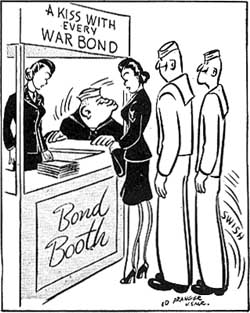 |
| Hoist (NTC, San Diego) |
Disbursing Officers Pass On Officers' Dependency
A number of naval officers have written to BuPers requesting determination of dependency of their parents for the purpose of receiving increased
rental and subsistence allowances despite the fact that BuPers rules only in dependency cases of enlisted personnel.
In calling attention to the provisions of BuSandA Manual, Art. 21423(e) (4), BuSandA stated last month that officers who desire determination of
dependency should consult their disbursing officers.
Although enlisted men receive increased family allowance for additional dependents, officers with dependents (wife, children, parents) are entitled
to only one increase in rental and subsistence allowance (over officers without dependents), regardless of the number of dependents.
School Opened to Teach Naval Courts and Boards
A naval justice school has been established at Port Hueneme, Calif., to train officers in Naval Courts and Boards. The course will consist of two
weeks' training and new classes will convene the first and third Mondays of each month.
In announcing the school the Judge Advocate General stated that as many officers as possible, especially COs of small vessels and separate and
detached commands, should take the course.
Requests for assignment from all vessels and amphibious training commands may be addressed, via official channels, to Commander, Operational
Training Command, Atlantic, or Commander, Operational Training Command, Pacific; from activities in Com 11, 12, 13, 14 and 17 to the Commandant of
the 11th ND, and from all others to BuPers. For details see BuPers Circ. Ltr. 191-45 (NDB, 30 June, 45-738).
-- 70 --
COs Need BuPers Okay Before Discharging Men On Bad Conduct Charges
COs of all ships and stations have been directed that sentences of dishonorable and bad-conduct discharges under which no confinement is to be
served and which are to be effected immediately, are to be carried out only on authority of BuPers. This action, in the interest of protecting the
rights of sentenced personnel, is to be effected regardless of the period of service of the enlisted personnel involved.
Enlisted personnel sentenced by general and summary court-martial and serving outside the continental U. S. are to be transferred to a receiving
ship or station in the U. S. to await instructions from BuPers. These instructions are to be requested without delay so that undesirable men may not
be retained in service any longer than necessary.
The letter requesting authority to effect the discharge shall state to what receiving ship or station the man will be transferred and an information
copy of that letter shall be forwarded to the ship or station concerned. Enlisted personnel at shore stations in the continental U. S. shall be retained
at those stations pending instructions from BuPers.
BuPers' policy is that convening and reviewing authorities should approve dishonorable and bad-conduct discharges only in cases where the men's records
show conclusively that they are not fit for retention in the Navy. Great care and judgment should be exercised in the cases of sentences involving theft.
If a sentence involving the discharge of an enlisted man is remitted, subject to a probationary period, the man's CO need not request authority from
BuPers to effect the discharge if the man's conduct during the probationary period does not justify further retention. Under these circumstances the CO
may terminate the probationary period and carry out the sentence.
In cases of either dishonorable or bad-conduct discharge pursuant to the sentence of a general court-martial when confinement is involved, prior
instructions from BuPers are not required. (For details see BuPers Circ. Ltr. 181-45: NDB, 30 June, 45-729).
 |
| Norfolk Seabag (NTS, Norfolk) |
| "... and suddenly my memory came back on the 29th day over leave ..." |
Unauthorized Absentees To Be Sent to Sea
All men involved in unauthorized absenteeism from ships or stations will, after adequate punishment has been administered, be sent to sea, if
physically qualified, under a new BuPers directive (Circ. Ltr. 206-45: NDB, 15 July, 45-817).
It will no longer be necessary to return a man to his original ship unless convenient; he may be assigned to any comparable sea duty. From now on
no man who absents himself from a shore station will be returned to his original station, since all disciplinary action will be taken by the command
to which he surrenders, and upon completion of this action he will be sent to sea.
Commandants and COs have again been instructed to observe carefully the provisions of this directive in order that no absentees escape adequate
punishment.
Policies on Musicians Announced by BuPers
Revised policies governing the assembling of Navy bands and orchestras, the transferring and replacing of musicians and the courses available at
the Naval Training School (Music), Navy Yard, Washington, D. C., where all such organizations are trained and assembled, were announced by BuPers
Circ. Ltr. 200-45 (NDB, 15 July, 45-812). The directive provides:
- Bands and orchestras when transferred from the school are to be assigned unit numbers and are to be kept intact by the activity to which
assigned.
- Replacement musicians must be obtained from the school and on BuPers orders.
- Units or individuals may not be transferred to other duty without BuPers approval. They may, however, be made available to BuPers for other duty by
reduction in complement, decommissioning of activity, or when individuals are hospitalized and it is impracticable to return them to their former
duty.
In general, units will not be replaced before completion of at least two years' foreign or sea duty, following which they will be reorganized and given
refresher training. Units which have received training at the Naval Training School (Music) will not be ordered to refresher training within a period of
at least two years, unless special circumstances necessitate such training.
For qualified personnel the following courses are available at the school:
- One year course for regular Navy seamen or Mus3c, who have not previously attended the school. Requests for transfer to this course may be submitted to
BuPers, via official channels. The application form printed with BuPers Circ. Ltr. 200-45 must accompany each request.
- Two to six months' course for Naval Reserve seamen. This course is filled primarily with recruits, but requests from exceptionally well-qualified men
will be considered (see procedure above). Successful completion of this course is one of the requirements for advancement to Mus3c.
- One year course for regular Navy men rated Mus1c, completion of which course is a requirement for advancement to CMus. Requests for transfer may be
submitted to BuPers, via official channels.
- Two to four months' refresher course for rated musicians of regular Navy and Naval Reserve. Personnel for this course are ordered in by BuPers as
required to assemble new bands and orchestras.
AFRS SHORTWAVE PROGRAM BROADCASTS
Complete program schedules of the various shortwave stations of the Armed Forces Radio Service will be read on the 1st and 15th of each
month during the following periods: |
ATLANTIC COAST OPERATION |
| Station |
Frequency
(in kilocycles) |
Broadcast Time
(GCT) |
| WCBX |
6,170 |
0505-0515 |
| WOOC |
7,820 |
0505-0515 |
| WCRC |
11,826 |
1105-1115 |
| WBOS |
15,210 |
1105-1115 |
| WBOS |
15,210 |
1731-1800 |
| WCBN |
17,830 |
1731-1800 |
| WLWL-1 |
15,230 |
1601-1615 |
| WLWL-2 |
17,955 |
1601-1615 |
| WBOS |
9,897 |
2205-2215 |
PACIFIC COAST OPERATION |
| Station |
Frequency
(in kilocycles) |
Broadcast Time
(GCT) |
| KROJ |
6,105 |
1005-1015 |
| KWIX |
9,855 |
1005-1015 |
| KGEI |
9,550 |
1005-1015 |
| KROJ |
6,105 |
1045-1100 |
| KGEI |
9,550 |
1045-1100 |
| KGEI |
9,550 |
1405-1415 |
| KGEI |
11,730 |
1705-1715 |
| KROJ |
11,740 |
1705-1715 |
| KROJ |
17,770 |
1930-1945 |
| KROJ |
15,190 |
2045-2100 |
| KROU |
17,780 |
2045-2100 |
| KROU |
17,780 |
2145-2200 |
| KGEX |
15,210 |
2145-2200 |
| KROJ |
17,770 |
0015-0030 |
| KROJ |
17,760 |
0305-0315 |
| KGEX |
15,210 |
0305-0315 |
| KROJ |
9,897 |
0415-0430 |
| KWID |
11,870 |
0415-0430 |
| KNBA |
13,050 |
0605-0615 |
| KNBC |
15,150 |
0605-0615 |
| KNBA |
13,050 |
0715-0730 |
| KNBC |
9,700 |
0715-0730 |
| KROJ |
11,740 |
0715-0730 |
| KRHO |
17,800 |
0315-0330 |
CORRECTION
In the list of ratings published last month from which volunteers are desired for submarine duty, CM was erroneously listed instead of GM. Details
may be found in ALL HANDS, July 1945, p. 71.
-- 71 --
Rules on Transmission Of Personal Messages Relaxed in Some Areas
Transmission of personal messages (Class E) has been resumed, effective 1 Aug. 1945, for naval personnel at shore bases under the following commands:
Commandant, 10th and. 15th NDs; ComNavEu and Commandants NOB Rio de Janeiro, NOB Argentina, and NOB Bermuda.
Class E messages are personal messages to or from naval personnel on which no charge is made for transmission over Navy communication circuits.
Charges are collected only when commercial systems are involved in the transmission or delivery.
Messages must be filed at a naval communication office in the commands specified for transmission to Radio Washington. If the message is addressed
to a person in Chicago or some other U. S. city, the only charge is for the transmission by commercial service from Radio Washington to the city of
the addressee. It works the same in reverse for messages being sent to naval personnel stationed in the above commands.
Naval radio stations, located in the commands concerned, which are now in direct communication with Radio Washington are: San Juan, Balboa,
Londonderry, Rio de Janeiro, Argentina and Bermuda.
The following are subjects acceptable and not acceptable as messages:
Acceptable: Matters of life and death, serious illness; personal arrangements or important personal business not of a recurrent nature, and
occasional greetings on important personal anniversaries.
Not acceptable: Trivial or frivolous messages; those of unnecessary length; holiday or anniversary greetings other than those specifically
permitted above; ordinary congratulatory messages, and frequent or recurrent messages pertaining to the conduct of a commercial venture.
Messages sent to personnel in the above commands by persons in the U. S. should be transmitted by telegraph, mail or filed by hand at the
Navy Department Communication Office, Washington, D. C. If filed by telegraph, the telegram should be addressed as in the following example:
Ens. John Paul Jones
U. S. Naval Operating Base, Navy 100
care Naval Communications
Washington, D. C.
| THIS MONTH IN HISTORY |
|
'Damn the Torpedoes!'
Although our Navy was not engaged in blasting Tokyo in August of 1864, it was, nevertheless, equally active in fighting the Battle of Mobile Bay.
Defending the wide entrance to the bay were two forts, Gaines and Morgan; two gunboats and the iron-clad ram Tennessee, and 180 torpedoes
(corresponding to our present-day mines) in the deep passage near Fort Morgan. To attack these forces Admiral David G. Farragut in the Hartford took
his fleet of 18 vessels early on 5 Aug. 1864.
His leading ship, the Tecumseh, struck one of the torpedoes and sunk. The Brooklyn, which was astern of her, stopped and backed,
and the combined action of the crew and wind so turned her across the channel that she blocked the passage of the ships astern.
Being unable to get the leading ships to go ahead, Farragut shouted "Damn the torpedoes! Full speed ahead!" and headed the Hartford for
the line of torpedoes. The other ships followed him and all passed safely into the bay.
With a few days the Confederate forts in the lower bay surrendered, excepting Fort Morgan, which held out until August 23d.
|
| |
Navy to Train Veterans In Shore Establishments
Under an agreement recently signed with the Veterans Administration, the Navy Department will train veterans of this war in skilled trades in
approximately 35 naval shore establishments, including ship yards, air stations, supply depots and ammunition depots.
The agreement is based upon Public Law 16, which provides for the rehabilitation of disabled veterans; Public Law 346 (the GI Bill of Rights),
which provides for Government aid for all eligible veterans, disabled or not, while training, and Executive Order 9503, which permits disabled
veterans without civil service status to be trained on the job.
"The Navy is deeply serious about its responsibility to veterans," declared Rear Admiral F. G. Crisp, USN, director of the Navy's division of
shore establishments and civilian personnel. "Through this agreement . . . it is hoped that a very real and worthwhile opportunity will be given
all veterans to establish themselves in skilled trades."
Some examples of how veterans would receive aid while training:
- An unmarried veteran applying under the GI Bill for training in a shipyard as Apprentice, Fourth Class, would receive $50 monthly from the Veterans'
Administration in addition to $4.64 a day, the normal pay rate. His daily rate of pay would increase as he progressed through the ranks to Apprentice,
First Class, which pays $7.12 a day.
- On the same basis, a married veteran would receive $75 monthly additional, instead of $50.
- An unmarried veteran with an 80% disability would, under Public Law 16, receive $92 from the Veterans Administration in addition to regular rates
of pay. If married, he would be entitled to $11.50 monthly allowance for his wife. Additional allowances are $5.75 for each child, and $11.50 for
each dependent parent.
Combined payments from apprentice wages and Government payments may not exceed regular journeyman's wage rates.
Navy shore establishments which have been certified to train veterans under the agreement follow:
Navy Yards: Portsmouth, N. H.; Boston, Mass.; New York, N. Y.; Philadelphia, Pa.; Washington, D. C.; Norfolk, Va.; Charleston, S. C.;
Mare Island, Calif.; Pearl Harbor, T. H.; Puget Sound, Bremerton, Wash.
Naval drydocks: Terminal Island, Calif.; Hunter's Point, San Francisco, Calif.
Naval Research Laboratory: Washington, D. C.
Torpedo Stations: Newport, R. I.; Keyport, Wash.; Alexandria, Va.
Air stations: Pearl Harbor, T. H.; Barber's Point, T. H.; Quonset Point, R. I.; Jacksonville, Fla.; Pensacola, Fla.; Corpus Christi,
Tex.; San Diego Calif.; Alameda, Calif.; Seattle, Wash.; Lakehurst, N. J.; Norfolk, Va.
Air Material Center: Philadelphia. Pa.
Supply depots: Oakland, Calif.; San Pedro, Calif.
Ammunition supply depot: Philadelphia, Pa.
Ammunition depot: Hastings, Neb.; Crane, Ind. ; McAlester, Okla.
Naval Observatory: Washington, D. C.
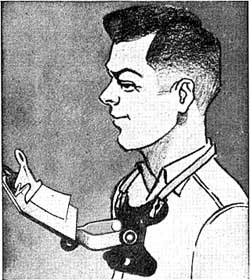
Message Holder Made From Surveyed Parts
An easy-to-make message holder (see cut) was made from surveyed parts of a sound-power telephone and clip board by men aboard the USS
Natrona to expedite the sending and recording of visual messages. Its advantages are: (1) eliminates need for assistance of a second
person in reading messages to the sender, (2) enables sender to have full use of both hands, if no assistance is available, and (3) affords
an easy means of holding signal blanks for recording incoming messages.
In announcing the device to the service, BuShips' letter (NDB, 15 July, 45-820) states that since delivery and manufacture of the device would
entail considerable delay in time, it is thought preferable that they be made up aboard ship. Sound-power phones must not be dismantled for the
construction of the message holder, but it may be made from available parts which have already been surveyed.
-- 72 --
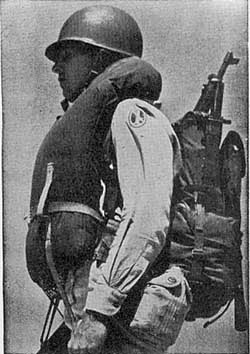
Troop-Carrying Vessels To Get New Life Jacket
As a result of extensive tests, the yoke-type Kapok life preserver (see above) has been developed as a replacement for the CO-2 dual-tube life belt
which in the past has been authorized for use of troops on troop-carrying vessels.
The new jacket may be worn either with or without pack, rifle and other gear, and is designed so that the pack may be removed without taking off
the life preserver. Likewise the preserver can be quickly removed when the wearer reaches shore without disturbing the pack or other gear worn. It
has sufficient buoyancy to support a man fully equipped with helmet, rifle, ammunition and pack.
The tie-tape at the neck of the preserver may be needed if the wearer is going to be immersed in choppy seas for a prolonged period. When the
tie-tape is used during landing operations, it should be tied in such a way that it can be slipped easily with one hand, even when wet. It should
never be tied in a square knot.
When properly adjusted, the preserver will support the wearer with his face out of the water even if he is unconscious.
The joint BuShips-BuSandA letter announcing the new-type jacket (NDB, 30 June, 45-751) points out that it will be distributed, as available,
only to troop-carrying vessels (in amounts equal to 105% of troop complement) and may not be issued except by the direction of ComServFor, Pacific.
Special requests and requisitions should not be forwarded to BuShips or BuSandA.
| KNOW YOUR ALLIES |
|
FRENCH NAVAL RATINGS
French naval ratings and their U. S. equivalents have been listed in a letter from Cominch (NDB, 15 July, 45-796). They are:
|
| U. S. NAVY |
FRENCH NAVY |
| Commissioned Warrant Officer |
Maitre Principal* |
| Warrant Officer |
Premier-Maitre |
| CPO |
Maitre |
| PO1c |
Second-Maitre 1re Classe |
| PO2c |
Second-Maitre 2eme Classe |
| PO3c |
Quartier-Maitre 1re Classe** |
| S1C |
Quartier-Maitre 2eme Classe |
| S2c |
Matelot Brevete |
| AS |
Matelot sans Specialite |
|
* No appropriate USN equivalent. This rank falls between warrant and commissioned warrant officer, USN, leaning
toward the former. It is not, however, considered "commissioned" in the French Navy.
** No appropriate USN equivalent. This grade falls between S1c and PO3c, leaning toward the latter.
|
| |
Personnel Visiting Mexico To Wear Civilian Clothes
Naval personnel must wear civilian clothes and must have tourist cards obtained from a Mexican consul when making unofficial visits to the interior
of Mexico, but passports are not required, according to instructions contained in BuPers Circ. ltr. 178-45 (NDB, 30 June, 45-726). All official visits,
to both the interior and to border towns, require passports and Mexican visas and will be made only in uniform.
Unofficial visits to border towns require only the Navy identification card if made in uniform but require a tourist card obtained from a Mexican
consul if made in civilian clothes. No passports are required.
Leave orders or authorization for unofficial visits to the interior must include authority to wear civilian clothes while traveling from the duty
station to the destination in Mexico and return to old or new duty station, as well as instructions to obtain a tourist card from a Mexican consul.
Commanding officers must be assured that personnel unofficially visiting the interior of Mexico have sufficient funds to provide for emergencies
and return to their stations and that they have a round trip ticket prior to departure if returning to same station.
Naval personnel visiting Mexico City, officially or unofficially, for a stay. of 18 hours or more, must register at the Office of the Naval
Attache, Mexico City. This requirement shall be incorporated in or appended to all travel orders or leave papers of naval personnel if such a visit
is planned.
The Department of State indicates that it is undesirable for large numbers of military personnel to visit the interior of Mexico in uniform
but there is no objection to unofficial visits to the interior by military personnel in civilian clothes.
Information concerning air priorities for naval personnel traveling by air to and from ports in Mexico is contained in BuPers Cire. Ltr.
37-45 (NDB, 15 Feb., 45-161).
| ANSWER TO PUZZLE ON PAGE 33 |
| Ans.-She simply added herself to the 17. Then the oldest brother took nine, the next six, and the youngest two. After which the
Arab lady went back home. |
| WHAT'S IN A NAME? |
|
Midshipman
This title was originally given to youngsters of the British Navy who acted as messengers and carried orders from the officers
to the crew. 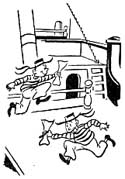 Since the crew was quartered in the forecastle while the officers lived
in the aftercastle, these lads were continuously going back and forth amidships, and acquired knowledge which made them good officer material.
The midshipman was considered an apprentice, and often began to work on his ship at the unseaworthy age of eight. It became the custom to consider
them as officer students. Many relatives of officers or members of influential families became members of the midshipman service. It was a natural
thing for the title of midshipman to become that of the undergraduate of the naval academy at Annapolis. Originally, in our service, the midshipman
after graduation at Annapolis was continued in that rank for at least two years at sea. He was then called "passed midshipman." The title of
"passed midshipman" has been abolished and graduates are now full-fledged ensigns. Since the crew was quartered in the forecastle while the officers lived
in the aftercastle, these lads were continuously going back and forth amidships, and acquired knowledge which made them good officer material.
The midshipman was considered an apprentice, and often began to work on his ship at the unseaworthy age of eight. It became the custom to consider
them as officer students. Many relatives of officers or members of influential families became members of the midshipman service. It was a natural
thing for the title of midshipman to become that of the undergraduate of the naval academy at Annapolis. Originally, in our service, the midshipman
after graduation at Annapolis was continued in that rank for at least two years at sea. He was then called "passed midshipman." The title of
"passed midshipman" has been abolished and graduates are now full-fledged ensigns.
|
| |
Tighten Food Ration Rules At Navy Commissaries
Only food ration books identified as belonging to authorized purchasers may be used in buying from Navy commissary stores, general messes and other
supply activities within the continental U. S., where specifically authorized, according to an advance change in BuSandA Memoranda, art. 1370-6.
The instructions state that the food ration book of each authorized purchaser, each member of his immediate family residing with him, and each servant
living in his home will be stamped or otherwise marked on the cover in such a manner as to identify it as valid for purchases of Navy food at the particular
activity.
If an authorized purchaser has a bona fide guest living in his home and eating at his table, the responsible officer in charge of sales may authorize
the purchaser to use the book of his guest.
Ration coupons and ration certificates may be accepted if the authorized purchaser satisfactorily establishes that such coupons were issued by the
OPA to the purchaser or the members of his immediate family.
No rationed foods will be sold in exchange for loose ration stamps, and no more than nine ration tokens will be accepted from a purchaser for
all purchases made during one visit to the sales activity. This does not limit the number of coupons which will be accepted.
-- 73 --
New Tax Rulings Affect AV(N) Payments, Personnel Outside U. S., and POWs
The Commissioner of Internal Revenue has recently issued the following new income-tax rulings of interest to naval personnel.
- Lump-sum payments made to naval personnel under section 12 of the Naval Aviation Cadet Act of 1942, as amended, upon their release from active
duty as AV(N) officers, constitute compensation for services. That is, they are a part of active duty pay.
- Such payments are not excludible from gross income under section 22(b)(5) of the Internal Revenue code as "amounts received as a pension, annuity,
or similar allowance for personal injuries or sickness resulting from active service in the armed forces of any country," even though the officer
may have been released from active duty because of physical disability.
- These lump-sum payments do not constitute "back pay" within the meaning of section 107(d)(2) of the Internal Revenue code and therefore cannot
be prorated over the years during which the officer was on active duty and for which such payments were made. The payments are held to constitute
income for the year in which they are received.
- Lump-sum payments made to the widow or other beneficiary of an AV(N) officer under section 12 of the Naval Aviation Cadet Act constitute gross
income to the beneficiary in the year in which payment is made.
- The pay of a member of the armed forces while in a missing status or while a prisoner of war is held to be received by him at the time it is
credited on his account: that is, the month in which it is earned. Such pay therefore is considered income for the year in which it was earned
even though the actual payment is not made until the man returns to the United States.
- The pay of a member of the armed forces is considered to have a source at the place where he is physically located at the time his pay accrues.
For example: (a) if a man is stationed in a possession of the United States (such as the Philippine Islands, Guam, Midway), his pay is considered
to have its source in that possession; (b) if he is a prisoner of war in Japan, the "source" is then Japan.
- Johnston Island is now considered a "possession of the United States" within the meaning of section 251 of the Internal Revenue code. Section 20
of the BuSandA Federal Income Tax Information pamphlet, dated 15 Nov. 1944, which listed Johnston Island as a "territory of the United States," is
amended accordingly.
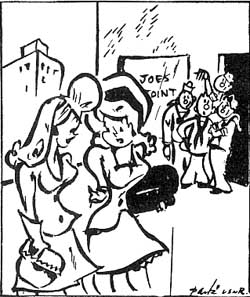 |
| Crew's News (USS Cumberland Sound) |
| "What's the use - we haven't any money!" |
Enlisted Uniform Continued For V-12s Shifted to NROTC
V-12 students who are transferred to NROTC will wear regulation enlisted men's uniforms except for formal use and while on leave or liberty, when
the NROTC midshipman uniform may be worn, according to V-12 Bulletin 312, dated 4 June 1945.
Students already in NROTC and medical, dental and theological students in V-12 will continue to wear the midshipman uniform, blue for winter and
khaki for summer. Off-duty uniforms for V-12 students transferred to NROTC also will be blue and khaki. Gray may not be worn.
Reason that V-12 men transferred to NROTC will continue to wear enlisted uniforms as working uniforms is that the appropriation for the coming
year is not sufficient to supply midshipman uniforms for the expanding NROTC, at least at present. As a result, only one blue and one khaki midshipman
uniform will be issued each transferred student.
Officer Volunteers Desired For Submarine Training
BuPers desires applications of volunteers for submarine training at the Submarine School, New London, Conn., from graduates of the Naval Academy
classes of 1944, 1945 and 1946 and from Naval Reserve ensigns and lieutenants (jg) not over 28 years of age and classified as (D), (E), (DE), (DEM),
(E)L-T and (E)-T.
Service requirements as set forth in BuPers Manual, E-1301 and E-1304, have been removed but beginning 1 Jan. 1946, officers will not be ordered to
the Submarine School until they have completed at least one year at sea.
Officers are selected upon the quality of their fitness report records and educational background. It is most desirable, according to BuPers Circ.
Ltr. 197-45 (NDB, 30 June, 45-809), that reserve officers have an educational background in engineering, or an excellent background in mathematics and
physics.
Applications must be accompanied by a certificate of a medical officer stating the candidate's physical fitness for submarine duty as established
by the Manual of the Medical Department (par. 1535).
Publishers Need Be Told Of New Mailing Address
To save man-hours in rehandling undeliverable second-class mail and to prevent unwanted publications from taking up needed shipping space, the
Postmaster General has approved a plan (announced in Postal Affairs Bulletin 7-45) under which publishers will be notified when magazines are not
deliverable at the address shown on the wrapper.
Publishers will then send a first-class letter to the address to which the magazine was originally mailed. The first-class letter will be sent
on to the man at his new address under the same postage. The subscriber will then need to notify the publisher of his new address if he wishes
copies of the magazines sent to him without further interruption.
Where personnel know they are soon to make a change of station, they can advise their publishers ahead of time of this change by using NavPers
Form 693 (change of address card) telling the publisher either to hold their magazines until they hear further from them, or supplying the publisher
with their new address, if it is known.
$60,000 Prize Offered In Literary Contest
A United Services Book Contest, with the winner hitting a jackpot possibly totaling more than $60,000, has been announced by three companies
jointly sponsoring it: Thomas Y. Crowell Company, American book publishers; George G. Harrap & Company, British book publishers, and Columbia
Pictures Corporation, motion picture producers.
Eligible for the contest are all present and former members of the armed forces of any of the United Nations (including Women's Reserve and
merchant marine).
The prize, an outright sum of $6,000, plus usual book royalties on American and British editions, and plus film be awarded to the most suitable
book-rights which could total $60,000, will length manuscript on any subject, either fiction or non-fiction, received on or before 30 June 1946. The
prize-winning book will be published in six foreign languages.
Designed to discover literary talent among the armed forces, the contest will run for at least two annual periods. If the judges fail to find a
writer worthy of the award, the outright prize money will be divided into six United Forces Book Fellowships of $1,000 each and will be awarded to
the most deserving contestants, to aid them in producing or completing their work.
Complete contest rules and entry forms may be obtained from Thomas Y. Crowell Company, 432 Fourth Ave., New York 16, N. Y., or George G. Harrap
& Company, London and Sydney, Australia.
-- 74 --
Servicewomen Discharged For Pregnancy Can Get Naval Maternity Care
Waves, Spars, women Marines! and Navy Nurses who are discharged or separated from the service because of pregnancy were declared eligible,
effective 1 July, for maternity care at naval activities during that pregnancy and confinement, and for out-patient postnatal care for such
period thereafter as the medical officer deems necessary.
The service is to be furnished without cost to the individual patient, except that subsistence charges during hospitalization are to be
collected locally at the rate prescribed by the annual Naval Appropriation Act, which for the 1946 fiscal year has been established at 80¢ a
day, and which includes the charge for the newborn child.
In making application for maternity care at a naval medical activity, a former enlisted woman must present a photostat of her certificate of
discharge together with a letter from her CO certifying her eligibility for maternity care. A former woman officer must present a certified copy
of her orders separating her from the service together with a similar letter from her CO.
For a complete list of hospitals and dispensaries where maternity care is provided see NDB, 15 June, 45-612.
VOTING INFORMATION
The following elections at which servicemen will be permitted to vote by State absentee ballot will be held during the period from 1 Sept. to 31 Dec.
1945. Unless otherwise indicated, eligible servicemen, members of the merchant marine and certain attached civilians may apply for an absentee ballot by
mailing at any time the postcard application (USWBC Form No. 1) which may be secured from the Voting Officer. Executed ballots must be received by
election officials by election day in order to be counted, unless otherwise indicated.
CONNECTICUT
General municipal elections will be held in most cities and towns throughout Connecticut on 1 Oct. 1945. At these elections, city and town officials
will be elected. General municipal elections will also be held in the following cities and towns on the dates indicated: 10 Sept.-New London; 2
Oct.-Colchester; 6 Nov.-Bridgeport, Hartford, New Haven, Waterbury; 4 Dec.-Meriden. Executed ballots in the case of elections held on 1 October must
be in the hands of local officials by 1200 on 1 October. In all other elections executed ballots must be in the hands of local officials by 1800 of
the day preceding the election.
ILLINOIS
A special congressional election will be held on 6 Nov. 1945 in the 24th Congressional District, comprised of the following counties: Clay, Edwards,
Hardin, Gallatin, Hamilton, Johnson, Massac, Pope, Saline, Wayne and White. At this election a Representative in Congress will be elected to fill the
present vacancy.
A general election will be held on 6 Nov. 1945 in the following counties: Alexander, Calhoun, Edwards, Hardin, Johnson, Massac, Menard, Monroe, Morgan,
Perry, Pope, Pulaski, Randolph, Scott, Union, Wabash and Williamson. One county commissioner will be elected, from each county.
MASSACHUSETTS
Municipal elections will be held on various dates in November and December in cities and municipalities in Massachusetts. Towns and cities holding
elections and the dates of such elections are as follows: 6 Nov.-Boston, Cambridge, Chicopee, Everett, Fall River, Fitchburg, Gardner, Leominister,
Lowell, Lynn, Marlborough, Medford, Newton, Pittsfield, Quincy, Somerville, Springfield, Waltham, Westfield, Worcester; 13 Nov.-Chelsea, Malden,
Melrose, New Bedford, Peabody, Woburn ; 4 Dec.-Brockton, Gloucester, Haverhill, Holyoke, Newburyport, Northampton, Salem, Taunton ; 11 Dec.-Lawrence,
North Adams and Revere.
MICHIGAN
A municipal general election will be held in the City of Detroit on 6 Nov. 1945. At this election a Mayor, City Clerk, City Treasurer, Councilmen and
Constables will be elected.
NEW JERSEY
A general state election will be held in New Jersey on 6 Nov. 1945, In all counties, members of the General Assembly and various county and local
officials will be elected. In addition, State Senators will be elected in Burlington, Cape May, Hunterdon, Middlesex, Passaic and Sussex counties.
NEW YORK
A general election will be held in New York on 6 Nov. 1945, for Mayors and other officials of cities (including New York City), towns and counties.
In addition, certain Justices of the Supreme Court will be elected. The military absentee voting law does not extend to members of the merchant marine
or to attached civilians. Executed ballots must be received by election officials before 1200 on 5 Nov. 1945 in order to be counted.
OHIO
A general election for city, village and township officials and members of Boards of Education will be held throughout Ohio on 6 Nov. 1945. Executed
ballots must be received by election officials by 1200 on 6 Nov. 1945, in order to be counted.
PENNSYLVANIA
A general election will be held in Pennsylvania on 6 Nov. 1945 for municipal, town and county officials. In addition, two Justices of the State
Superior Court will be elected. Executed ballots must be received by the County Board of Elections not later than 1000 on 16 Nov. 1945.
VIRGINIA
A general state election will be held in Virginia on 6 Nov. 1945. At this election the Governor, Lieutenant Governor, Attorney General, Members of
the House of Delegates and certain local officers will be elected. The military absentee voting law does not extend to members of the merchant marine
or to attached civilians. Executed ballots must be received by 3 Nov. 1945, to be counted.
Officer from Sunken Ship To Assist in Processing
To assist in processing enlisted personnel who are survivors of sunken ships, one officer from each such vessel is to be designated by the CO for
temporary assignment to the receiving ship or station at which the survivors are being handled. Following this temporary duty, the officer will report
to the commandant of the naval district for further assignment by BuPers, under provisions of BuPers Circ. Ltr. 203-45 (NDB, 15 July, 45-814).
NSI Five-Year Policies Extended Three Years
All five-year level premium term National Service Life insurance policies issued prior to 1 Jan. 1946 have been automatically extended for three years
by Public Law 118 passed last month by the 79th Congress signed by the President on 2 July and announced to the service by Alnav 153-45 (NDB, 15 July,
45-784). Allotments to pay premiums now in effect need not be renewed or increased.
The three year extension was necessary because the first NSI policies, issued 8 Oct. 1940, were due to expire 8 Oct. 1945 unless converted to permanent
insurance. Likewise, each month thereafter an increasingly large number of policies would reach the end of the five-year period.
Passage of the law actually divides all five-year term insurance policies into two groups: (1) those issued between 8 Oct. 1940 and 31 Dec. 1945,
which may be continued for eight years from date of issue without change in premium paid while kept on the term plan, and (2) those issued after 31 Dec.
1945, which will be for five years only.
The extension granted to those policies in the first group is not affected by discharge from the naval service of the insured either before or after
passage of the extension authorization. Conversion privileges, including retroactive conversion to the original date of issue, also remain unchanged
during the three-year extension.
For instance, a five-year policy issued on 1 Nov. 1940 may be continued until 1 Nov. 1948 as term insurance, during which time the insured need not
change his allotment or premium payment in any manner. Likewise a policy issued on 1 Nov. 1945 may be maintained without change until 1 Nov. 1953. To
determine the new date of expiration for an individual policy, a policyholder need only add eight years to the date on which the policy originally went
into effect. If an insured has more than one NSI five-year term policy with different effective dates, he must determine the expiration date for each
policy separately.
The three-year extension does not in any way change NSI policies previously converted to one of the three permanent plans.
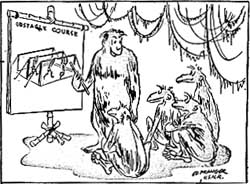 |
| Hoist (NTC, San Diego) |
| "This is known as the hand-over-hand obstacle, and is good to know for the purpose of crossing a stream or making one's way through
jungles and trees." |
-- 75 --
MONTH'S ALNAVS IN BRIEF
No. 139-Cancels Alnav 47-45 (NDB, 15 Mar., 45-234) on sale of gift items by ships service stores and PXs.
No. 140-Repeats for clarity sentence of Alnav 120-45 (NDB, 15 June, 45-620) on reporting of casualties.
No. 141-Amends Alnav 58-45 (NDB, 15 April, 45-343) to read that original dispatches from ships and stations within continental U. S. reporting
deaths are to contain all information required by Navy Regs. Art. 908(2) and those outside continental limits are to comply with Alnav 120-45 (NDB,
cum. ed., 42-2043).
No. 142-States that, effective 1 July, all transportation requests for travel of naval personnel and dependents and all meal tickets issued to
naval personnel are to show appropriation as "Transportation and Recruiting Naval Personnel" instead of "Pay Subsistence and Transportation."
No. 143-Calls for applications by dispatch to BuPers before 1 August from regular Navy Supply Corps officers, lieutenants, or below, for two year
postgraduate course , in textile engineering for class to convene Sept. 1945.
No. 144-Amends reference in Alnav 141-45 (above).
No. 145-Announces that for 1946 fiscal year, funds for pay and subsistence and for transportation and recruiting of naval personnel were separated
into two appropriations.
No. 146-Extends general order on extra pay for proficiency in use of arms (see p. 78).
No. 147-Suspends for duration certain regulations on entry in deck log of names of passengers with times of coming aboard and leaving.
No. 148-Announces appointment to next higher rank for temporary service, to rank from 1 July 1945, of regular and reserve Navy Nurse Corps lieutenants
(junior grade) whose present rank occurred 1 Aug. 1944 or earlier and who reported for continuous active duty as ensigns 1-31 Dec. 1942 inclusive, and
those ensigns who reported for continuous active duty as ensigns 2-29 Feb. 1944 inclusive.
No. 149-Announces appointment to next higher rank for temporary service, to rank from 1 July 1945, of those lieutenants (junior grade) and ensigns,
line and staff corps, on active list of regular Navy whose dates of rank are within period 2-29 Feb. 1944 inclusive, and those lieutenants (junior grade)
and ensigns, line and staff corps, of Naval Reserve and Women's Reserve whose dates of commencement of continuous active duty in their respective ranks
are within the same period.
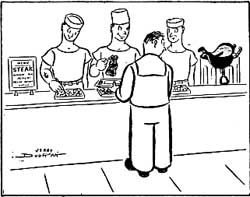 |
| Norfolk Seabag (NTS, Norfolk) |
No. 150-Announces appointment to chief warrant rank for temporary service, to rank from 1 July 1945, of those warrant officers on active list
of regular Navy whose dates of rank are within the period 2-29 Feb. 1944 inclusive, and those warrant officers of Naval Reserve whose dates of
commencement of continuous active duty are within the same period.
No. 151-Changes name of Nakagusuku Wan in Southeast Okinawa to Buckner Bay.
No. 152-Announces two five-month courses at the Naval War College, Newport, R. I. beginning 1 Jan. 1946: a command course for approximately
15 regular Navy officers, lieutenant commander and above, and a preparatory staff course for 5.0 reserve officers of ranks of lieutenant commander,
lieutenant, and lieutenant (junior grade) ; applications via official channels to reach BuPers prior to 15 Sept. 1945.
No. 153-Deals with extension of NSI insurance (see p. 75).
No. 154-Directs that railway express shipments containing Navy property or Navy issue personal effects shipped at request of naval personnel at
own expense must be sent prepaid, with serial or service number shown on shipping tag.
No. 155-Deals with changes in clothing allowance (see p. 65).
No. 156-Directs that mail requiring forwarding be immediately, completely and correctly re-addressed by unit from which addressee has been
transferred to prevent breakdown of personal mail delivery caused by large and rapid movements of personnel in and to the Pacific.
No. 157-Discontinues effective 2 July 1945 extra pay for Navy mail clerks and assistant Navy mail clerks; waives requirements for bonding them:
states that bonds executed bearing effective date to and including 1 July 1945 will not be terminated until end of premium years unless postal duties
cease prior thereto. Alnav does not apply to Marine Corps and Coast Guard personnel.
No. 158-Makes change in reference in Navy Travel Instructions.
No. 159-States that port of Tacoma, Wash., has been declared plague-free as of 5 July 1945.
No. 160-Provides for 30-day furlough in States for officers and enlisted men who have been outside U. S. for 24 months or longer (see p. 66).
No. 161-States that because of present large backlog of applications from reserve officers desiring flight training, Alnav 63-45 (NDB, 15 April, 45-348)
is canceled effective 2 Aug. 1945 and no further requests will be considered at present time; applications are still desired from U. S. Naval Academy
graduates, classes 1944 and 1945, and should bear endorsement by medical examiner as to physical qualifications for flight training and give scores on
aviation aptitude tests.
No. 162-States that National Institute of Health allows five year period for normal human plasma dried 51-3530 and 51-3531, and that all human plasma
dried in stock which has expiration date during 1945 or earlier should be extended for two years from date on package.
No. 163-Modifies rules for advancement of enlisted personnel. For details see p. 66.
No. 164-Announcement that Independence Day cash war bond purchases amounted to $91,276,948.25, which is 46% above Navy's previous bond campaign,
and congratulates all hands on purchases of $291,000,000 of bonds made through allotments and cash purchases.
| PROMOTIONS BY ALNAV |
A total of 9,554 officers were made eligible for promotion to next higher rank by Alnavs 148, 149 and 150, briefed on this page.
The breakdown:
Naval Reserve (including Women's Reserve): 1,305 to lieutenant, 5,437 to lieutenant (junior grade) and 298 to commissioned warrant officer.
Regular Navy: 291 to lieutenant, 1,116 to lieutenant (junior grade) and 857 to commissioned warrant officer.
Nurse Corps (Naval Reserve): 36 to lieutenant and 201 to lieutenant (junior grade); (Regular Navy): One to lieutenant and 11 to lieutenant
(junior grade).
In addition to these promotions, 659 men were appointed for temporary service to commissioned and warrant officer ranks: 33 to lieutenant (junior
grade), 15 to ensign and 108 to warrant officer in the Naval Reserve, and 68 to lieutenant (junior grade), 80 to ensign, one to commissioned warrant
officer and 354 to warrant officer in the regular Navy. A complete list of names of those promoted is contained in BuPers Circ. Ltr. 201-45 (NDB, 15
July).
|
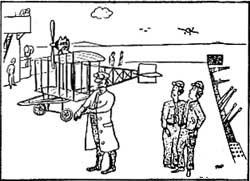 |
| Tadcen Topics (NT&DC, San Diego) |
| "I was inclined to scoff at first, too - but he has eight Jap planes to his credit." |
-- 76 --
Jobs in State Department Foreign Service Offered Qualified Navy Personnel
Qualified personnel of the Navy, Marine Corps and Coast Guard who are interested in careers as Foreign Service Officers, in the Department of State,
are offered the opportunity of joining the service, according to announcements recently made.
Political and economic problems arising from the present war make it imperative that the Foreign Service be expanded and members of the armed forces
and honorably discharged veterans are being given the first chance to join the expanded service.
Opportunities are available to commissioned, warrant and enlisted personnel of the regular U. S. Navy, Marine Corps and Coast Guard, and reserve
components, including the Women's Reserve, stationed in the continental United States (exclusive of Alaska and Newfoundland), in the Caribbean area
and in the European theater.
Written examinations will be given on 19 and 20 Nov. 1945 at sites designated by the Navy and State Departments. Application blanks for designation to
take the examination may be obtained from COs.
Candidates who pass the written and subsequent oral examinations will be placed on an eligibility list valid for two years, and may be called up for
commissioning in the Foreign Service at any time during that period if they can be released from the armed forces without prejudice to the war effort.
The Navy Department will give favorable consideration, subject to the needs of the service, to applications for release from active duty or separation
from the naval service of commissioned or warrant officers, or discharge of enlisted men, who have been selected by the Department of State for
commissioning as Foreign Service Officers.
Applicants entering the Foreign Service in the unclassified grades generally start at the minimum base salary of $2,500 per year, although some may
be admitted at salary levels ranging up to $3,400 if age and previous experience warrant special consideration. The maximum base salary for highest
ranking officers is $10,000. While officers are abroad their salaries are supplemented by rental and cost-of-living allowances varying according to
the post, the size of the officers' families, and prevailing exchange rates.
Foreign Service Officers comprise counselors of embassy or legation, diplomatic secretaries, consuls general, consuls and vice consuls. They serve
in normal times at more than 250 posts, located at key points all over the world. Assignments generally range from two to five years at one post.
Qualifications necessary for designation to take the written examination are:
Educational: Bachelor's or equivalent degree from an accredited college or university; or, if course was interrupted by entrance into the armed forces,
applicant must have completed approximately three-fourths of it.
Language: Read with reasonable facility at least one of the following - French, German, Spanish. Knowledge of any other language will be taken into
consideration on the oral examination.
Latest fitness report: Commissioned and warrant officers must be rated at least average on the old fitness report form, or within the top 70%
on the new form. Official efficiency ratings will not be a determining factor for an enlisted man. His CO will be required to state, in the application
endorsement, his opinion of applicant's character and potential leadership qualities.
Age: Born between 1 July 1915 and 1 July 1924.
Citizenship: U. S. citizen for at least 15 years prior to 1 July 1945.
Marital status: May not be married to an alien.
Military service: Minimum of one year of active military service by 1 Jan. 1945.
Applications from within the continental U. S. are to be forwarded by the CO to the Board of Examiners for the Foreign Service, P. O. Box 592,
Princeton, N. J., so as to be received not later than 18 Aug. 1945. Applications from outside the continental U. S. are to be forwarded by the CO
to the Chief of Naval Personnel (Att.: Educational Services Section), Washington 25, D. C.
Marine Corps personnel outside U. S. should forward applications to Headquarters, U. S. Marine Corps, Washington 25, D. C., and Coast Guardsmen to
Headquarters, U. S. Coast Guard, Washington 25, D. C. Applications from outside the continental U. S. must be received not later than 10 Sept. 1945,
for transmission to the Department of State.
Applicants designated by the Department of State will be notified through their respective services. COs are authorized to grant successful
applicants leave, subject to the convenience of the service, to take the exams at designated sites in their territories.
For details see BuPers ltr. dated 20 June 1945, Pers-4-ohs, ES 24; Marine Corps ltr of inst. No. 1065 dated 28 June 1945.
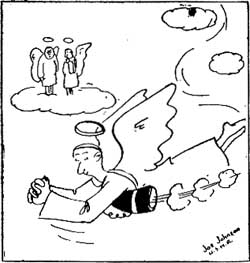 |
| Bluejacket (NATTC, Memphis) |
| "There goes Abercrombie, showing off with his jet propulsion again." |
NEW V-DISC RELEASES
Following is the list of V-Discs contained in the August kit, Navy Release N, to be mailed the middle of the month to ships and naval activities
outside continental limits and hospitals in the U. S. treating battle casualties. For information on how to get the discs, recorded exclusively for
the armed forces, see table in the April 1945 issue, pp. 70-71.
261. CLASSICAL SYMPHONY (Prokofieff) Parts 1 and 2 - Toscanini and NBC Symphony Orchestra.
262. I CAN'T GIVE YOU ANYTHING BUT LOVE; LITTLE BROWN JUG - Maj. Glenn Miller; I CAN'T GET STARTED; KEEP THE HOME FIRES BURNING - Charlie Barnet.
263.HARLEM AIRSHAFT - Duke Ellington; HIGH TIDE - Count Basie.
264. TURN YE TO ME - Bidu Sayao; MY WILD IRISH ROSE; LOCH LOMOND - Richard Crooks.
265. MY HEART AND I; Too ROMANTIC; ALL YOU WANT TO DO IS DANCE - Bing Crosby; WHAT MORE CAN A WOMAN DO? YOU WAS RIGHT, BABY - Peggy Lee.
266. AM I BLUE? - Jo Stafford; YOU CAME ALONG - Martha Tilton.
267. COMIN' AROUND THE CORNER; HUMORESQUE - Guy Lombardo; FLYIN' HOME - Red Norvo.
268. I HOPE TO DIE IF I TOLD A LIE; NO, BABY, NOBODY BUT YOU - Erskine Hawkins; CONFESSIN' - Louis Armstrong.
269. NONE BUT THE LONELY HEART - Frank Sinatra; THERE'LL BE A JUBILEE - Mildred Bailey - Benny Goodman.
270. HOW LONG HAS THIS BEEN GOING ON? - Lena Horne - Phil Moore; I'LL BE AROUND; YOU ALWAYS HURT THE ONE YOU LOVE; PAPER DOLL - The Mills Brothers.
271. SALT PEANUTS - Plink, Plank and Plunk; I FEEL SO GOOD; TELL ME BABY - Big Bill.
272. ALONG THE NAVAJO TRAIL; SOMEONE TO WATCH OVER ME - Dinah Shore; CLOSE AS PAGES IN A BOOK - AAFTC Orchestra.
273. CANDY; A TRIO GROOVES IN BROOKLYN - King Cole Trio; SCHUBERT'S SERENADE; TOSELLI'S SERENADE - John Kirby.
274. NO NAME JIVE - Casa Loma; I WAS HERE WHEN YOU LEFT ME - Louis Prima.
275. YOU CAN SAY THAT AGAIN; ZOOT GIBSON STRIDES AGAIN - Harry "The Hipster" Gibson; SYLVIA; POLLYWOLLY DOODLE - The Korn Kobblers.
276. THERE MUST BE A WAY; SWEETHEART OF ALL MY DREAMS - Charlie Spivak; EV'RY TIME; YOU BROUGHT A NEW KIND OF LOVE TO ME - Benny Goodman.
277. THAT OLD BLACK MAGIC - Morton Gould; HUNGARIAN DANCE NO. (Brahms) - AAFTC Symphonette.
268. BEAT ME DADDY EIGHT TO THE BAR - Will Bradley; HODGEPODGE; CARAVAN - Bobby Sherwood.
279. OUT OF THIS WORLD; GOOSEY GANDER - Woody Herman; MAKE LOVE TO ME; B-19 - Harry James.
280. CUDDLE UP A LITTLE CLOSER; BELL BOTTOM TROUSERS - Ginny Simms; RACHMANINOFF THEME (Concerto No. 2); ROSEMARY - Freddy Martin.
-- 77 --
Men Ashore Get Extra Pay For Learning Use of Arms Not Required by Ratings
Extra compensation, ranging from $1 to $5 per month, has been ordered for enlisted men in the Navy and Coast Guard ashore who
achieve proficiency in the handling of certain arms which their own ratings do not require them to know but knowledge of which is
useful when assigned by their COs to shore battle stations. The provision is contained in Executive Order No. 9557, signed by the
President on 26 May and effective as of 1 May, and which modifies Executive Order No. 9210 of 1 Aug. 1942. A similar provision is
already in effect for such personnel serving at battle stations aboard ships. The provisions were announced to the service by Alnav
146-45 (NDB, 30 June, 45-710).
Under the new ruling, a storekeeper, for instance, who studies and learns how to operate radar equipment (or any other "arms"
such as gun pointer, master horizontal bomber, rangekeeper operator, etc., as listed in BuPers Manual, Art. D-5312) would be
eligible for the extra money when assigned to a battle station, either ashore or afloat, where the knowledge would be required.
Petty officers performing duties normally included within the scope of their ratings are not eligible to receive extra compensation
for the use of such arms.
While the provisions of this order also apply to personnel who qualify as expert pistol shots, expert riflemen and rifle
sharpshooters, extra compensation payments to such personnel were suspended until further notice by Cominch letter dated 20
April 1945 (FFl/A5-6 Serial: 3695).
Navy to Commend Families For Outstanding Service
In recognition of outstanding family contribution to the war, the Secretary of the Navy will, when practicable, extend by letter
his personal congratulations and the commendation of the Navy Department to mothers of families with four or more immediate members
in the armed forces, at least half of whom are serving in the Navy, Marine Corps or Coast Guard, or have served since 7 Dec. 1941.
Although no attempt will be made to search out all mothers in this category, when evidence of outstanding family service as
defined above comes to the attention of BuPers it will be considered for submission to the Secretary.
It will be helpful if evidence forwarded to BuPers contains the name and address of the mother; names of four or more immediate
family members in the armed forces, specifying branch of service, rank or rate, serial number, and name and address of wife or husband.
Sp (S) Qualifications
Qualifications for Specialist (S) (V-10) rating - personnel supervisor - have been announced in BuPers Circ. Ltr. 193-45 (NDB,
30 June, 45-740).
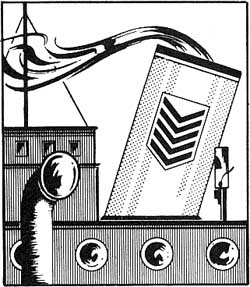
Vessels Returned by Navy To Have Service Chevrons
Service chevrons, each representing six months of naval service, have been approved for vessels which the Navy acquired, but
which have now been returned to their original owners.
The chevrons, authorized by the Secretary of the Navy, are to be painted on the ship's stack or in the vicinity of the bridge (above).
Approximately 187 of these small vessels, mostly fishing craft and yachts, which were used and are still being used to patrol
coastal waters, have so far been returned to their owners. When the vessel is no longer needed by the Navy, the owner is notified
as to the number of chevrons it rates.
Merchantmen May Wear Philippine Ribbons
President Truman has authorized the wearing of the Philippine Defense and Philippine Liberation ribbons by merchant officers and
seamen who served on merchant ships participating in those operations. The ribbons are to be worn under rules and regulations similar
to those prescribed for naval personnel, details of which were published in the May 1945 ALL HANDS, p. 72.
Insignia Authorized For U. S. Technicians
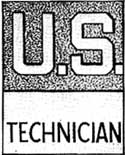
Insignia for U. S. technicians was approved by SecNav last month. Although these civilian specialists, who are employees of
private contractors but working with the Navy on highly technical problems, have previously been authorized to wear regulation naval officers' uniforms,
no insignia has previously been authorized, other than the embroidered spread-eagle breast insignia. The new gold shield is to be worn on the
regulation officers' cap. In miniature size it is worn as the collar and garrison cap insignia.
Oriental Language Schools Open to Qualified Men
Billets are available for qualified male officer or male enlisted applicants in the Naval Schools of Oriental Languages at the
University of Colorado, Boulder, Colo., and Oklahoma A&M College, Stillwater, Okla., and BuPers has announced that applications will
be received until further notice.
Courses are Japanese (14 months), Chinese (18 months), Malay (six months) and Russian (six months). All courses call for a minimum
of 4½ hours of classroom instruction daily, six days a week; in addition, the student is expected to devote 9 hours a day to
preparation outside the classroom.
So far as possible, the language studied is used in the mess halls. Foreign language newspapers, foreign language broadcasts and
foreign language movies are provided. Daily use of the language in extra-curricular activities is an essential part of the instruction.
All applicants must have completed a minimum of two years' college work. From among those who meet the college requirement, two
categories of students are selected:
- Applicants whose college record is of a high honor standing and who show evidence of special linguistic ability in the
study of one or more foreign languages. (All applicants who submit a knowledge of a foreign language will be examined directly
in that language.)
- Applicants who show a minimum of two years of college work of Phi Beta Kappa grade (a minimum of 80% As, or rank in the
top 5% of the class or average grades of 3.6 and above on the Navy scale).
No exceptions are made to the age requirements of from 19 to 29, incl.
Upon successful completion of three months' work in any one of the courses, students enrolled in civilian or enlisted status will
be recommended by the CO for appointment as commissioned officers in the Naval Reserve, if physically and in all respects fully
qualified for such appointment. (Waivers of minor defects, non-organic in nature, will be considered.)
Personnel who are commissioned after successfully completing three months of the course but who subsequently fail to complete the
entire course may be discharged froth the Naval Reserve in the event that other billets for which they are qualified are not available.
Students who enter the course as officers and fail are made available for general duty.
In addition to applications which are forwarded through official channels by COs to BuPers (Att: P-422), applications may also be
made with COs approval to the interviewing officer at the time interviews are held at centrally located naval activities.
Applications may be made on the form enclosed with BuPers ltr. Pers-4225-jm over NC 155, dated 5 May 1945, to all U. S. shore
stations, or on the similar one in BuPers Circ. Ltr. 376-45 (NDB, July-Dec., 44-1405).
-- 78 --
Specialist Rating Created For Welfare Assistants
BuPers has established a new division of the specialist rate, Specialist (E), for recreation and welfare assistants and motion picture service
personnel, and has added a new designator to Specialist (X) for personnel with the Armed Forces Radio Service and special Navy radio units (BuPers
Circ. Ltr. 194-45: NDB, 15 July, 45-806).
To be eligible for Specialist (E), personnel must be performing fulltime duties either as recreation and welfare assistants or as motion picture
service bookers. Designators for the two categories, which will be used with the rate in all cases, are (RW) and (PS), respectively.
Personnel must be performing fulltime duties with the Armed Forces Radio Service or special Navy radio units before they can be rated Specialist
(X) with the new designator of (RS).
To be eligible for Specialist (E) (RW), personnel must have had a minimum of one year of professional experience in civilian life (or have had
service experience equal thereto) in this type of work; be at least 21 years of age, and have a high school education or its equivalent.
Specialist (E) (RW) personnel assist the recreation and welfare officer of an activity in planning, developing, directing, producing, publicizing,
maintaining and supervising welfare and recreation programs and services involving entertainments, picnics, dances, parties, music, dramatics, game
rooms, libraries, arts and crafts, sports and games, liberty services, station papers and other activities of a recreational nature; assist in the
selection, distribution, maintenance and renovation of recreational equipment and facilities; assist in maintaining records and accounts of the entire
welfare and recreation program for the activity.
To be eligible for Specialist (E) (PS), personnel must have had a minimum of one year of professional experience in commercial or Navy motion
picture booking and have had a high school education or its equivalent. They must be professionally qualified to book commercial motion pictures
to Navy activities under the Optional Naval District Motion Picture Plan and maintain proper records in connection therewith; to book, program
and maintain specialized records peculiar to the motion picture industry for Navy Motion Picture Exchanges; maintain over-all control of shipment
and receiving of prints.
To be eligible for Specialist (X) (RS), personnel must have had at least two years' experience on nationally prominent radio programs in
their respective fields, or equivalent service experience. They must be able to perform duties incident to the operation, administration, program
production and other functions of the Armed Forces Radio Service and special Navy radio units; be experienced in at least one of the following
fields: program and music production; radio writing; announcing; studio and transmitting engineering.
When qualifications (as distinguished from description of duties of rates and requisites therefor) are published for Specialist, (E) and
allowances established for Specialist (E) and Specialist (X) (RS), requests may be submitted to BuPers for changes to the new categories (of
equal pay grade) or for initial advancements to Specialist (E), third class (appropriate designator) or Specialist (X), third class, (RS), to
fill vacancies in allowance.
No qualifications will be published for Specialist (X) (RS).
Waves may qualify as Specialists (E) (RW) and (X) (RS) but are not eligible to become Specialists (E) (PS).
Under normal conditions, Specialist (E) ratings will be assigned subject to the following general restrictions:
Specialist (E) (RW) - One allowed to each activity of more than 500 enlisted personnel, with one additional allowed for each additional 500
enlisted personnel in the activity. In addition to the foregoing, in the case of Fleet Recreation Centers (serving fleet units), additional
complements of Specialist (E) (RW) may be authorized, based on recommendations submitted by responsible area commanders.
Specialist (E) (PS) - Allowance will be assigned to activities only upon recommendation of BuPers, district commandants or, in the case of
motion picture exchanges outside the continental U. S., upon recommendations of area commanders.
Specialist (X) (RS) - Allowance will be assigned to activities only upon recommendation of BuPers, or, in the case of Armed Forces Radio
Service stations and special Navy radio units overseas, upon recommendations of area commanders.
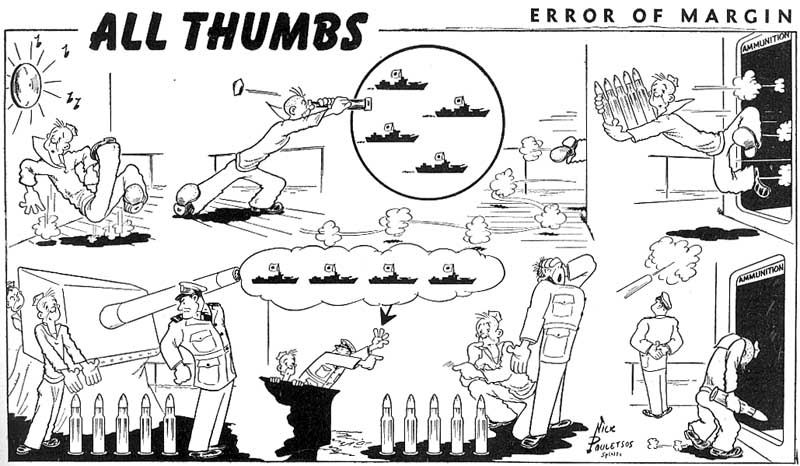
-- 79 --
| FANTAIL FORUM |
| QUESTION: What's the best liberty town you ever hit? |
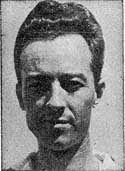 TEMPLETON B. HAMILTON, ARM3c, Charleston, W. Va.: "It's just no contest. New York is far and away the best town in the world. And I say that even
though my 'home' in New York was the worst place in the whole Navy - Pier 92. Even that seemed worth putting up with when you considered that you
were only eight minutes from Broadway . . . and the time of your life!" TEMPLETON B. HAMILTON, ARM3c, Charleston, W. Va.: "It's just no contest. New York is far and away the best town in the world. And I say that even
though my 'home' in New York was the worst place in the whole Navy - Pier 92. Even that seemed worth putting up with when you considered that you
were only eight minutes from Broadway . . . and the time of your life!" |
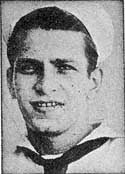 JOSEPH BRILLA, AMM1c, Welshfield, Ohio: "I've got two choices. It's a tie for first place between Chicago and Washington. Now you take Chicago:
That Servicemen's Center is terrific. Thirteen floors, and something different on every floor. Old Chi is just jam-packed with entertainment and
good-lookers. And then you take Washington: It's got so many places of historic interest. A visit to Washington is like a college education. And,
of course, don't forget the girls there! Wow! Almost too many!" JOSEPH BRILLA, AMM1c, Welshfield, Ohio: "I've got two choices. It's a tie for first place between Chicago and Washington. Now you take Chicago:
That Servicemen's Center is terrific. Thirteen floors, and something different on every floor. Old Chi is just jam-packed with entertainment and
good-lookers. And then you take Washington: It's got so many places of historic interest. A visit to Washington is like a college education. And,
of course, don't forget the girls there! Wow! Almost too many!" |
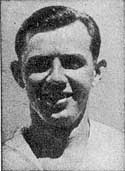 BENNETT H. FUNK, FC3c, Baltimore, Md.: "Liverpool - that's the town for me. A lot of guys'll try to tell you that New York is the best liberty
town. They're crazy. That town's full of robbers. Best town in the U. S. A. for liberty is a little place called Fall River, Mass. Yeah, don't laugh
- Fall River. There's plenty to do, and no trouble doin' it. As I said, though, best in the world is Liverpool. There the women rush up and grab you
by the arm. And the Red Cross treats you swell, too!" BENNETT H. FUNK, FC3c, Baltimore, Md.: "Liverpool - that's the town for me. A lot of guys'll try to tell you that New York is the best liberty
town. They're crazy. That town's full of robbers. Best town in the U. S. A. for liberty is a little place called Fall River, Mass. Yeah, don't laugh
- Fall River. There's plenty to do, and no trouble doin' it. As I said, though, best in the world is Liverpool. There the women rush up and grab you
by the arm. And the Red Cross treats you swell, too!" |
 RUSSELL N. BROWN, StM2c, Detroit, Mich.: "Guess I can't pick my own home town, huh? Nothing can beat that old burg. But running it a close
second in my book is New York. I've had many a good time in old Manhattan. There's more places to go and more things to do in that town than any
I've ever seen. Lots of good night clubs and red-hot spots. People are swell to you and make you feel right at home." RUSSELL N. BROWN, StM2c, Detroit, Mich.: "Guess I can't pick my own home town, huh? Nothing can beat that old burg. But running it a close
second in my book is New York. I've had many a good time in old Manhattan. There's more places to go and more things to do in that town than any
I've ever seen. Lots of good night clubs and red-hot spots. People are swell to you and make you feel right at home." |
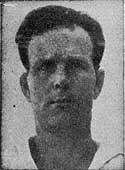 O. F. HALL, S2c, Nashville, Tenn.: "I've had a good time practically every place I've gone, but I guess the top one of 'em all is Baltimore.
More good-looking women there than any place and lots of lively spots. That town's got plenty of wine, women and song . . . and, I ask you, what
more could a fellow on liberty want? Huh? Did you say: 'Chow'? Listen, if a fellow wants to waste time eating, he'll find plenty of good chow in
Baltimore - especially seafood, I guess." O. F. HALL, S2c, Nashville, Tenn.: "I've had a good time practically every place I've gone, but I guess the top one of 'em all is Baltimore.
More good-looking women there than any place and lots of lively spots. That town's got plenty of wine, women and song . . . and, I ask you, what
more could a fellow on liberty want? Huh? Did you say: 'Chow'? Listen, if a fellow wants to waste time eating, he'll find plenty of good chow in
Baltimore - especially seafood, I guess." |
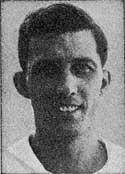 GENE BUFALINO, Sp (A) 1c, Pittston, Pa.: "I don't think you can beat Washington, D.C. I've been up and down the East Coast from Florida
to Massachusetts and, although I've never failed to have a good time on liberty in any of the towns, Washington is the tops. Folks are mighty
friendly to servicemen, there's flocks of good-looking girls, there's lots of things to do and plenty of places to see. Of course, this time of
the year the weather is kinda hot, but it's not as bad as some people say." GENE BUFALINO, Sp (A) 1c, Pittston, Pa.: "I don't think you can beat Washington, D.C. I've been up and down the East Coast from Florida
to Massachusetts and, although I've never failed to have a good time on liberty in any of the towns, Washington is the tops. Folks are mighty
friendly to servicemen, there's flocks of good-looking girls, there's lots of things to do and plenty of places to see. Of course, this time of
the year the weather is kinda hot, but it's not as bad as some people say." |
 CARL B. HARRIS, EM1c, Richmond, Va.: "I'll take New York. It's got the best and the most of everything. If it's museums you want, they got
'em - bigger 'n' better'n any other town. Or if it's night clubs, or libraries, or parks, or theaters, they got 'em - the best in the world. And
most important so far as I'm concerned, it's got three major league ball parks. No matter when you hit town you're sure to catch at least one of
the teams." CARL B. HARRIS, EM1c, Richmond, Va.: "I'll take New York. It's got the best and the most of everything. If it's museums you want, they got
'em - bigger 'n' better'n any other town. Or if it's night clubs, or libraries, or parks, or theaters, they got 'em - the best in the world. And
most important so far as I'm concerned, it's got three major league ball parks. No matter when you hit town you're sure to catch at least one of
the teams." |
 DOUGLAS B. HAYES, S2c, Schoolfield, Va.: "Gimme Boston any old time. Boy, there's the place to have yourself a peck of fun . . . and for cheap.
I'm telling you there's no end of good-looking, friendly gals. Would I like to live there for keeps? Well, not exactly. But if I'm going to be in the
Navy a long time I sure wouldn't squawk any if they ever told me, 'Hayes, we're gonna station you in Boston!" DOUGLAS B. HAYES, S2c, Schoolfield, Va.: "Gimme Boston any old time. Boy, there's the place to have yourself a peck of fun . . . and for cheap.
I'm telling you there's no end of good-looking, friendly gals. Would I like to live there for keeps? Well, not exactly. But if I'm going to be in the
Navy a long time I sure wouldn't squawk any if they ever told me, 'Hayes, we're gonna station you in Boston!" |
ALL HANDS
THE BuPERS INFORMATION BULLETIN
With approval of the Bureau of the Budget, this magazine is published monthly in Washington, D. C., by the Bureau of Naval Personnel for the
information and interest of the naval service as a whole. Opinions expressed are not necessarily those of the Navy Department. Reference to regulations,
orders and directives is for information only and does not by publication herein constitute authority for action. All original material may be reprinted
as desired. Original articles of general interest may be forwarded to the Editor.
DATES used throughout are local time at scene of action unless otherwise indicated.
SECURITY: Since this magazine is not classified, it often is limited in its reporting and publication of photographs. It therefore cannot always
fully record achievements of units or individuals, and may be obliged to omit mention of accomplishments even more noteworthy than those included.
REFERENCES made to issues of ALL HANDS prior to the June 1945 issue apply to this magazine under its former name, The Bureau of Naval Personnel
Information Bulletin. The letters "NDB," used as a reference, indicate the official Navy Department Bulletin; followed by the initials "cum. ed,"
they refer to the cumulative edition of 31 Dec. 1943, which superseded all semi-monthly issues through that date; by "Jan.-July" or "July-Dec.," to
the collated volumes for those six-month periods of 1944, containing all 1944 letters still in effect at the end of each of the two periods.
DISTRIBUTION: By BuPers Circ. Ltr. 16243 (NDB., cum. ed., 31 Dec., 43-1362) the Bureau directed that appropriate steps be taken to insure that all
hands have quick and convenient access to this magazine, and indicated that distribution should be effected on the basis of one copy for each ten
officers and enlisted personnel to accomplish the directive.
In most instances, the circulation of the magazine has been increased in accordance with complement and on-board count statistics in the Bureau, on
the basis of one copy for each ten officers and enlisted personnel. Because intra-activity shifts affect the Bureau's statistics, and because organization
of some activities may require more copies than normally indicated to effect thorough distribution to all hands, the Bureau invites requests for additional
copies as necessary to comply with the basic directive. This magazine is intended for all hands and commanding officers should take necessary steps to
make it available accordingly.
The Bureau should be kept informed of changes in the numbers of copies required; requests received by the 20th of the month can be effected with the
succeeding issue.
The Bureau should also be advised if the full number of copies are not received regularly.
Normally copies for Navy and Coast Guard activities are distributed only to those on the Standard Navy Distribution List in the expectation that such
activities will make further distribution as necessary; where special circumstances warrant sending direct to sub-activities, the Bureau should be
informed.
Distribution to Marine Corps personnel is effected by the Commandant, U. S. Marine Corps, on the present basis of four copies per unit, down to and
including the company. Requests from Marine Corps activities should be addressed to the Commandant.
At ship's stores and ship's service stores where unit packaging plan for magazines is in effect, ALL HANDS is on sale to naval personnel at 15¢
per copy as indicated on the cover of those issues.
PERSONAL COPIES: This magazine is for sale by Superintendent of Documents, U. S. Government Printing Office, Washington 25, D. C.: 20 cents
per copy; subscription price $2.00 a year, domestic (including FPO and APO addresses for overseas mail); $2.75, foreign. Remittances should be
made direct to the Superintendent of Documents. Subscriptions are accepted for one year only.
-- 80 --
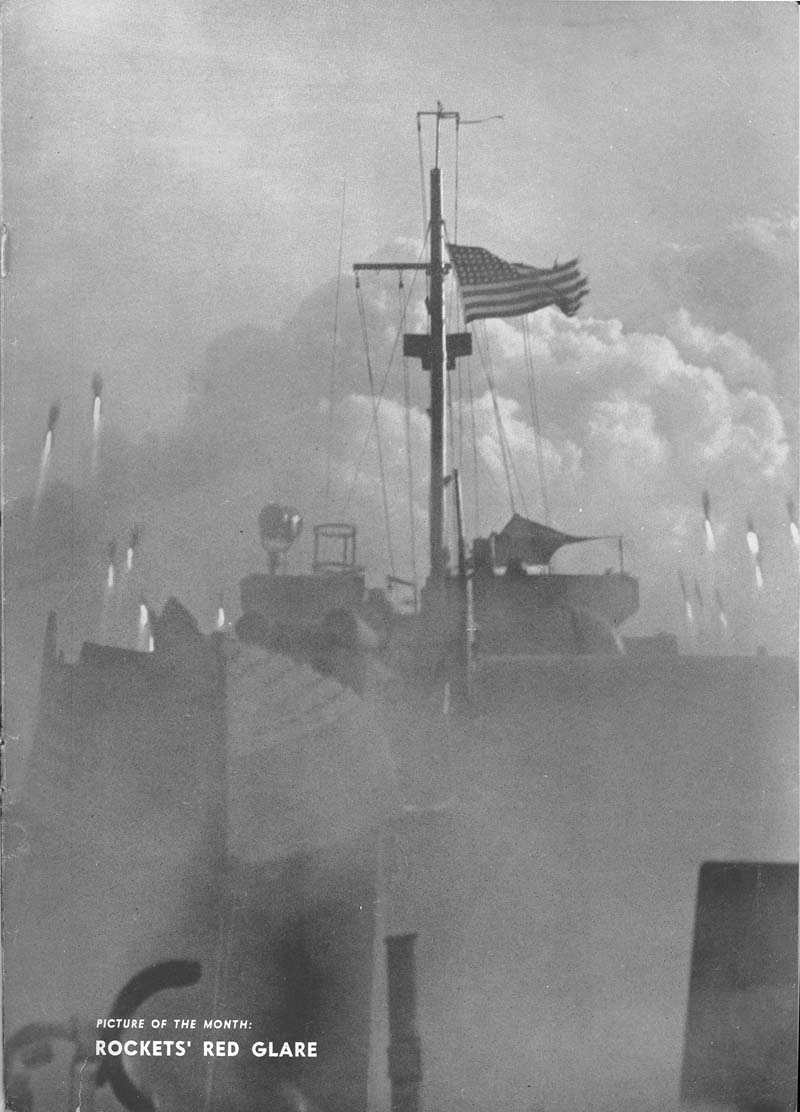
-- Back Inside Cover --
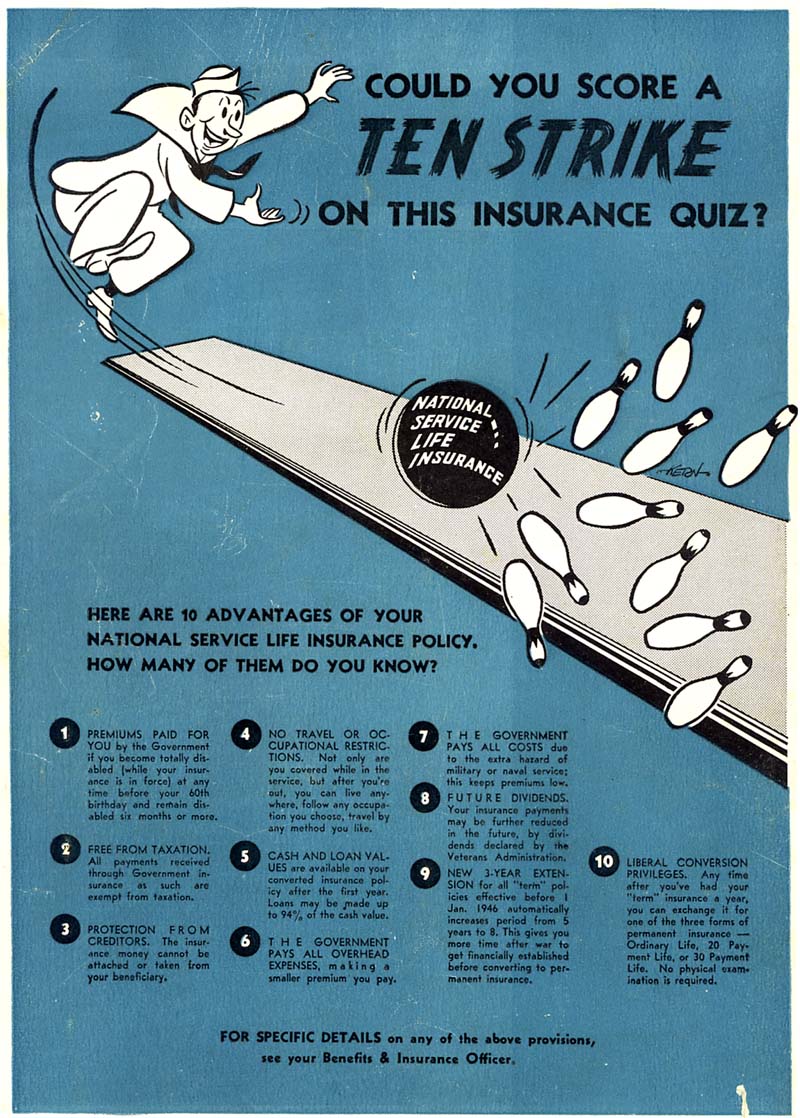
-- Back Cover --
Table of Contents
Previous Section [Decorations And Citations]










 Since the crew was quartered in the forecastle while the officers lived
in the aftercastle, these lads were continuously going back and forth amidships, and acquired knowledge which made them good officer material.
The midshipman was considered an apprentice, and often began to work on his ship at the unseaworthy age of eight. It became the custom to consider
them as officer students. Many relatives of officers or members of influential families became members of the midshipman service. It was a natural
thing for the title of midshipman to become that of the undergraduate of the naval academy at Annapolis. Originally, in our service, the midshipman
after graduation at Annapolis was continued in that rank for at least two years at sea. He was then called "passed midshipman." The title of
"passed midshipman" has been abolished and graduates are now full-fledged ensigns.
Since the crew was quartered in the forecastle while the officers lived
in the aftercastle, these lads were continuously going back and forth amidships, and acquired knowledge which made them good officer material.
The midshipman was considered an apprentice, and often began to work on his ship at the unseaworthy age of eight. It became the custom to consider
them as officer students. Many relatives of officers or members of influential families became members of the midshipman service. It was a natural
thing for the title of midshipman to become that of the undergraduate of the naval academy at Annapolis. Originally, in our service, the midshipman
after graduation at Annapolis was continued in that rank for at least two years at sea. He was then called "passed midshipman." The title of
"passed midshipman" has been abolished and graduates are now full-fledged ensigns.







 TEMPLETON B. HAMILTON, ARM3c, Charleston, W. Va.: "It's just no contest. New York is far and away the best town in the world. And I say that even
though my 'home' in New York was the worst place in the whole Navy - Pier 92. Even that seemed worth putting up with when you considered that you
were only eight minutes from Broadway . . . and the time of your life!"
TEMPLETON B. HAMILTON, ARM3c, Charleston, W. Va.: "It's just no contest. New York is far and away the best town in the world. And I say that even
though my 'home' in New York was the worst place in the whole Navy - Pier 92. Even that seemed worth putting up with when you considered that you
were only eight minutes from Broadway . . . and the time of your life!" JOSEPH BRILLA, AMM1c, Welshfield, Ohio: "I've got two choices. It's a tie for first place between Chicago and Washington. Now you take Chicago:
That Servicemen's Center is terrific. Thirteen floors, and something different on every floor. Old Chi is just jam-packed with entertainment and
good-lookers. And then you take Washington: It's got so many places of historic interest. A visit to Washington is like a college education. And,
of course, don't forget the girls there! Wow! Almost too many!"
JOSEPH BRILLA, AMM1c, Welshfield, Ohio: "I've got two choices. It's a tie for first place between Chicago and Washington. Now you take Chicago:
That Servicemen's Center is terrific. Thirteen floors, and something different on every floor. Old Chi is just jam-packed with entertainment and
good-lookers. And then you take Washington: It's got so many places of historic interest. A visit to Washington is like a college education. And,
of course, don't forget the girls there! Wow! Almost too many!" BENNETT H. FUNK, FC3c, Baltimore, Md.: "Liverpool - that's the town for me. A lot of guys'll try to tell you that New York is the best liberty
town. They're crazy. That town's full of robbers. Best town in the U. S. A. for liberty is a little place called Fall River, Mass. Yeah, don't laugh
- Fall River. There's plenty to do, and no trouble doin' it. As I said, though, best in the world is Liverpool. There the women rush up and grab you
by the arm. And the Red Cross treats you swell, too!"
BENNETT H. FUNK, FC3c, Baltimore, Md.: "Liverpool - that's the town for me. A lot of guys'll try to tell you that New York is the best liberty
town. They're crazy. That town's full of robbers. Best town in the U. S. A. for liberty is a little place called Fall River, Mass. Yeah, don't laugh
- Fall River. There's plenty to do, and no trouble doin' it. As I said, though, best in the world is Liverpool. There the women rush up and grab you
by the arm. And the Red Cross treats you swell, too!" RUSSELL N. BROWN, StM2c, Detroit, Mich.: "Guess I can't pick my own home town, huh? Nothing can beat that old burg. But running it a close
second in my book is New York. I've had many a good time in old Manhattan. There's more places to go and more things to do in that town than any
I've ever seen. Lots of good night clubs and red-hot spots. People are swell to you and make you feel right at home."
RUSSELL N. BROWN, StM2c, Detroit, Mich.: "Guess I can't pick my own home town, huh? Nothing can beat that old burg. But running it a close
second in my book is New York. I've had many a good time in old Manhattan. There's more places to go and more things to do in that town than any
I've ever seen. Lots of good night clubs and red-hot spots. People are swell to you and make you feel right at home." O. F. HALL, S2c, Nashville, Tenn.: "I've had a good time practically every place I've gone, but I guess the top one of 'em all is Baltimore.
More good-looking women there than any place and lots of lively spots. That town's got plenty of wine, women and song . . . and, I ask you, what
more could a fellow on liberty want? Huh? Did you say: 'Chow'? Listen, if a fellow wants to waste time eating, he'll find plenty of good chow in
Baltimore - especially seafood, I guess."
O. F. HALL, S2c, Nashville, Tenn.: "I've had a good time practically every place I've gone, but I guess the top one of 'em all is Baltimore.
More good-looking women there than any place and lots of lively spots. That town's got plenty of wine, women and song . . . and, I ask you, what
more could a fellow on liberty want? Huh? Did you say: 'Chow'? Listen, if a fellow wants to waste time eating, he'll find plenty of good chow in
Baltimore - especially seafood, I guess." GENE BUFALINO, Sp (A) 1c, Pittston, Pa.: "I don't think you can beat Washington, D.C. I've been up and down the East Coast from Florida
to Massachusetts and, although I've never failed to have a good time on liberty in any of the towns, Washington is the tops. Folks are mighty
friendly to servicemen, there's flocks of good-looking girls, there's lots of things to do and plenty of places to see. Of course, this time of
the year the weather is kinda hot, but it's not as bad as some people say."
GENE BUFALINO, Sp (A) 1c, Pittston, Pa.: "I don't think you can beat Washington, D.C. I've been up and down the East Coast from Florida
to Massachusetts and, although I've never failed to have a good time on liberty in any of the towns, Washington is the tops. Folks are mighty
friendly to servicemen, there's flocks of good-looking girls, there's lots of things to do and plenty of places to see. Of course, this time of
the year the weather is kinda hot, but it's not as bad as some people say." CARL B. HARRIS, EM1c, Richmond, Va.: "I'll take New York. It's got the best and the most of everything. If it's museums you want, they got
'em - bigger 'n' better'n any other town. Or if it's night clubs, or libraries, or parks, or theaters, they got 'em - the best in the world. And
most important so far as I'm concerned, it's got three major league ball parks. No matter when you hit town you're sure to catch at least one of
the teams."
CARL B. HARRIS, EM1c, Richmond, Va.: "I'll take New York. It's got the best and the most of everything. If it's museums you want, they got
'em - bigger 'n' better'n any other town. Or if it's night clubs, or libraries, or parks, or theaters, they got 'em - the best in the world. And
most important so far as I'm concerned, it's got three major league ball parks. No matter when you hit town you're sure to catch at least one of
the teams." DOUGLAS B. HAYES, S2c, Schoolfield, Va.: "Gimme Boston any old time. Boy, there's the place to have yourself a peck of fun . . . and for cheap.
I'm telling you there's no end of good-looking, friendly gals. Would I like to live there for keeps? Well, not exactly. But if I'm going to be in the
Navy a long time I sure wouldn't squawk any if they ever told me, 'Hayes, we're gonna station you in Boston!"
DOUGLAS B. HAYES, S2c, Schoolfield, Va.: "Gimme Boston any old time. Boy, there's the place to have yourself a peck of fun . . . and for cheap.
I'm telling you there's no end of good-looking, friendly gals. Would I like to live there for keeps? Well, not exactly. But if I'm going to be in the
Navy a long time I sure wouldn't squawk any if they ever told me, 'Hayes, we're gonna station you in Boston!"
